

Is an economics PhD still a great deal?
Yes, but for different reasons than a decade ago..

My most popular post at my old blog, back in 2013, was called “ If you get a PhD, get an economics PhD ”. People still ask me about it to this day. In that post, I categorized PhD’s into three types:
Lifestyle PhDs , in which you get to think about fun stuff and exist in a stimulating intellectual community, but probably will struggle to find a job in your field,
Lab science PhDs , in which you will get a job after years of busting your butt working for a P.I. at a lab bench or in a cleanroom, and
PhDs that work , i.e. programs that get you both good job opportunities, intellectual fulfillment, and the lifestyle of an independent scholar.
Econ, I argued, was the paradigmatic example of the third type. As it’s mostly not a grant-funded lab science, PhD students get relative autonomy — a chance to think their own thoughts and set their own schedules. But because there are so many good job opportunities in econ — professorships, business school professorships, private sector econ jobs galore — you can largely do your own thing and be assured of a glide path to the upper middle class. And because economists occupy (or at least, occupied) a rather unique place in society, you can do all of this while still being afforded the respect given to the sages of the ivory tower. Thus, I argued, econ was the PhD that offered the best of all possible worlds.
To a large extent, that is still true. Econ still offers a good amount of personal and intellectual autonomy, despite a modest rise in grant funding and postdocs and the other trappings of lab science. There are still more academic jobs than for many other fields, thanks to the continued growth of business schools . And though economists are perhaps not viewed as the all-purpose sages they used to be, they are still afforded quite a bit of respect. Furthermore, the culture of econ is changing in ways that greatly mitigate the traditional downsides. In fact, overall I’d say that the economics PhD is an even better deal than it used to be.
Here are a few ways I see the landscape as having shifted in the decade since I got my degree.
The rise of data science
One of the most important trends over the past decade has been the emergence of data science as a highly lucrative and accessible field for people with PhDs. This field is red-hot — data scientists are some of the best-paid workers in industry, and demand for them continues to grow . This is being driven by a number of trends, but basically there are two stories here. First, the internet has generated a huge amount of data, and companies need people to wrangle that data and extract value from it. Second, deep learning turned out to basically be magic for many applications.
For economists, the first of these is more relevant. Yes, after a while in data science you might get into deep learning, but it’s not something that economists necessarily start out as specialists in; if that’s your goal you’re probably better off just going through computer science. Economists’ core strength is in statistical modeling; thanks in part to the empirical turn in the profession since the 1990s, people with econ PhDs are some of the better applied statisticians out there. So they’re a perfect fit for plenty of data science jobs that even Masters-level people can’t really do.
In fact, it’s extremely easy to transition from econ into the world of data science. You can just apply for jobs directly, or you can go through a boot camp like Insight that will quickly teach you the extra stuff you need to know. A good friend of mine from grad school decided to do this after she left her professor job; she now makes three times what her peak salary as a prof would have been. Not bad. And while figuring out how to optimize Spotify recommendations or whatever might not be quite as intellectually stimulating as searching for the true causes of unemployment, it does present you with a bunch of interesting mathy problems to solve. And if you’re into that sort of thing, it’s an alternative gateway to a lucrative career in tech company management for people who didn’t go the software engineer route.
Data science may not be the first job of choice for economists who want to do real econ work, but it provides a very safe and lucrative outside option that barely existed a decade ago. (This has more than compensated for the winnowing of quant finance, and it’s also far less soul-crushing.)
The boom in private-sector econ jobs
Data science uses the stuff you learned in econometrics, but it isn’t really an econ job per se. Fortunately, a lot more companies are hiring economists to do actual economics. For a primer, read this 2018 paper by Susan Athey and Michael Luca (Athey is probably the second-most-famous private sector economist after Hal Varian, and is one of the profession’s true geniuses, so heed her advice).
Essentially their are two stories here. First, tech companies have created a whole lot of online marketplaces — Google Ads auctions, Amazon Marketplace, two-sided search markets for Uber and Lyft, and a whole lot of others. They need economists to figure out how these markets work, and — perhaps more importantly — how they should work. In a way, creating an idealized market from scratch could be more intellectually fulfilling than studying more “natural” markets; with the magic of software, an economist can create the kind of economic interactions that previously were just theoretical approximations!
The second trend is, as before, the empirical turn in econ. The credibility revolution has produced a generation of economists who are able to think very subtly and intelligently about how to isolate causality from natural experiments and policy experiments. That’s something that’s proving increasingly valuable to businesses, who have all too often led astray by correlations that turn out not to be structural. Whether it’s A/B testing, or causal inference for marketing, or just figuring out the determinants of demand, companies want economists who can help them empirically understand how their corner of the world really works.
The softening of econ culture
One other way that an econ PhD has become an even better deal is that the culture of the profession has become much less dominated by jerks. I can’t actually prove this to you, but young people can feel it . I can, however, describe roughly what has changed.
First, there has been a big backlash against sexism (and, to some degree, racism) in the profession. A series of academic papers exposed the field’s gender bias from a variety of angles — toxic online forums , discrimination in the credit for co-authorships, discrimination in the peer review process , and so on. A few high-profile sexual harassment scandals chastened the behavior of some top male economists. The people who run the profession — which, if you don’t know, is a very hierarchical profession — have made concrete moves to signal that sexism and racism aren’t allowed. One example is banning interviews in hotel rooms .
These are small in substantive terms, but they send a strong signal about what type of behavior and attitudes will result in economists getting shut out from plum jobs. There are still a few universities that specialize in hiring disgraced professors, but overall the “old boys’ club” of economics is on the way out.
The erosion of sexism dovetails with another big change in econ culture, which is the decline of bullying. There has been a concerted effort to push back on professors who try to destroy speakers in the seminar room; the era of “Well, this is really more of a comment than a question” is rapidly fading. I conjecture that this also has something to do with the empirical turn in economics — when theory isn’t disciplined by evidence, a loud-shouting bully might advance his ideas to the forefront of the profession by force of personality alone, but when you have to bring data, that kind of crap just doesn’t work.
Finally, economics has become more politically progressive . Whether this is a good thing or a bad thing obviously depends on your personal politics. But since most of the Americans who are considering a PhD are going to be progressive, the fact that econ isn’t an outlier in this regard probably makes the field more attractive.
Add up all these changes, and the result is that doing an econ PhD no longer means having to worry (or at least, not having to worry nearly as much) about navigating an entrenched old boys’ club of right-wing bullies. That’s a big plus!
The changing role of economists in American society
Better culture, more private-sector jobs, and lucrative outside options in data science — those are three major ways that an econ PhD is an even better deal than it was in 2012. But there’s at least one major way in which econ is less like a $20 that someone left lying on the ground. Economists’ intellectual prestige has dwindled a bit.
Back in the 2000s, at the height of the finance-driven Bush years, economists were viewed as sort of all-purpose sages. Americans were thrilled to read economists’ insights on everything from abortion to how to name your kids. Economists held pride of place among presidential advisors, determining the fate of nations — or just telling you where to get a bite to eat .
The financial crisis and the Great Recession brought that world crashing down, and that definitely diminished economists’ prestige a bit. Donald Trump was another factor — he famously had little use for economists, preferring instead to rely on his own clumsy bellowing and aggressive tariffs rather than the nostrums of some academic scribblers. The utter disregard for the free-trade consensus — perhaps the only thing economists agreed on at the time — was a major symbolic defeat for the profession, and one that Biden shows no intention of reversing . In fact, astute observers have noticed a diminished role for economists in the current administration as well.
One more factor, I think, was the shifting of America’s fault lines to non-economic issues — matters of history, of race and gender, of culture and nation. Those deep questions about the nature of our society make the quotidian matters of real estate portfolios and GDP numbers less central to our lives, and I think that made Americans less likely to ask economists for their advice about anything and everything.
So if you do get an econ PhD, don’t expect to walk around and have people view you as a sage. It’s a bit more like being a biologist now — you have your area of expertise, and most (but not all) people will acknowledge it, but if you go outside your field you’ll be considered an amateur.
Personally, I like that better, but your mileage may vary.
General warning about getting a PhD
So the econ PhD is still one of the best PhDs you can get. I’d put it up there with computer science and applied math, which share many of these advantages. But remember that doing any PhD is going to have some major drawbacks and challenges. As I wrote in my 2013 post:
[A]n econ PhD program is still a PhD program. That means, first of all, that you will be in poverty in your late 20s. That is not fun for most people (some "lifestyle PhD" students and bohemian artists excepted). Also, econ PhD programs force you to manage your own time, while giving you very little feedback about how well or badly you're actually doing. That can be stressful and depressing.
PhD programs famously put an enormous strain on the mental health of many students. Even those who come out of it just fine often remember it as a very difficult time in their lives. That’s obviously not true for everyone — some people remember their PhD programs as the best days of their lives. But it’s a risk you should be aware of.
But if you decide that a PhD program is right for you, then I think you could easily do worse than economics. The role of economists in society has changed in the last decade, but in most ways I’d say it’s even better than before.
Ready for more?
Explore your training options in 10 minutes Get Started
- Graduate Stories
- Partner Spotlights
- Bootcamp Prep
- Bootcamp Admissions
- University Bootcamps
- Coding Tools
- Software Engineering
- Web Development
- Data Science
- Tech Guides
- Tech Resources
- Career Advice
- Online Learning
- Internships
- Apprenticeships
- Tech Salaries
- Associate Degree
- Bachelor's Degree
- Master's Degree
- University Admissions
- Best Schools
- Certifications
- Bootcamp Financing
- Higher Ed Financing
- Scholarships
- Financial Aid
- Best Coding Bootcamps
- Best Online Bootcamps
- Best Web Design Bootcamps
- Best Data Science Bootcamps
- Best Technology Sales Bootcamps
- Best Data Analytics Bootcamps
- Best Cybersecurity Bootcamps
- Best Digital Marketing Bootcamps
- Los Angeles
- San Francisco
- Browse All Locations
- Digital Marketing
- Machine Learning
- See All Subjects
- Bootcamps 101
- Full-Stack Development
- Career Changes
- View all Career Discussions
- Mobile App Development
- Cybersecurity
- Product Management
- UX/UI Design
- What is a Coding Bootcamp?
- Are Coding Bootcamps Worth It?
- How to Choose a Coding Bootcamp
- Best Online Coding Bootcamps and Courses
- Best Free Bootcamps and Coding Training
- Coding Bootcamp vs. Community College
- Coding Bootcamp vs. Self-Learning
- Bootcamps vs. Certifications: Compared
- What Is a Coding Bootcamp Job Guarantee?
- How to Pay for Coding Bootcamp
- Ultimate Guide to Coding Bootcamp Loans
- Best Coding Bootcamp Scholarships and Grants
- Education Stipends for Coding Bootcamps
- Get Your Coding Bootcamp Sponsored by Your Employer
- GI Bill and Coding Bootcamps
- Tech Intevriews
- Our Enterprise Solution
- Connect With Us
- Publication
- Reskill America
- Partner With Us
- Resource Center
- Bachelor’s Degree
- Master’s Degree
Best Doctorates in Economics: Top PhD Programs, Career Paths, and Salaries
If you’re a graduate student and interested in pursuing an advanced study in the field of economics, you should start researching the best PhDs in Economics. By enrolling in an economics PhD program, you’ll be getting an in-depth education on past and current economic trends.
In this article, we’ll try to help you choose the right PhD in Economics by going over some of the best programs in the United States. We’ll also cover some of the highest-paying economics jobs on the market and provide an overview of the PhD in economics salary possibilities.
Find your bootcamp match
What is a phd in economics.
A PhD in Economics degree is an advanced doctoral degree program that studies the distribution and consumption of goods and services. Economics classes teach students to analyze small-scale and global-scale economic factors to make predictions for future markets.
The main goal of economics departments in PhD programs is to teach students how to help different institutions improve and optimize their economic actions. Through a mix of teaching, research, and a heavy course load, economics grad students will perfect their quantitative skills and learn to make decisions that increase the profitability of the organizations they work for.
How to Get Into an Economics PhD Program: Admission Requirements
The admission requirements to get into an economics PhD program include a bachelor’s degree in a related field and a minimum 3.0 GPA. Other admission requirements can include GRE exam scores, letters of recommendation, a statement of purpose, and a resume. Admissions counselors will look at a student’s comprehensive experience before grad school.
Different schools have other specific admission requirements for their economics PhD programs, but all international and English as a second language-speaking (ESL) students will have to submit proof of English proficiency in the form of Test of English as a Second Language (TOEFL) exam scores.
PhD in Economics Admission Requirements
- Bachelor’s or master’s degree in a related field
- Minimum 3.0 GPA
- GRE test scores (optional for most schools)
- Two to three letters of recommendation
- Proof of English proficiency (for ESL and international students)
- Statement of purpose
- Previous knowledge in math-intensive subjects, such as economic theory, statistics, mathematics, differential and integral calculus, and linear algebra
Economics PhD Acceptance Rates: How Hard Is It to Get Into a PhD Program in Economics?
It can be very hard to get into economics PhD programs. Economics PhD acceptance rates vary between 2.4 and 7.4 percent. At Johns Hopkins University, for example, only 12 students are selected to enroll in the Economics PhD program out of more than 500 applications.
How to Get Into the Best Universities
[query_class_embed] how-to-get-into-*school
Best PhDs in Economics: In Brief
Best universities for economics phds: where to get a phd in economics.
The best universities for PhD economics programs include Arizona State University, John Hopkins University, Syracuse University, and Drexel University. These schools will adequately equip you with the economic knowledge and skills needed to ensure you are ready for a well-paying job in the economics career path of your dreams. Continue reading for all you need to know to prepare for grad school at one of the top Phd in Economics degree programs.
Arizona State University is a public research university founded in 1886. It is considered one of the best institutions for superior education. ASU offers more than 400 graduate degree programs led by experts and has been ranked as the nation’s most innovative university by US News & World Report .
PhD in Economics
This economics PhD program provides training in microeconomic and macroeconomic theory, applied economics, and econometrics. Classrooms are relatively small, with about 45 graduate students, to facilitate mentoring and provide greater faculty attention within the department of economics. The program prepares students for teaching and research positions in the field of economics.
PhD in Economics Overview
- Program Length: 5 years
- Acceptance Rate: Not stated
- Tuition: $ 858/credit (in state); $1,361/credit (out of state)
- PhD Funding Opportunities: National Science Foundation Graduate Research Fellowship, graduate teaching assistantships
- Bachelor's or master's degree from a regionally accredited institution
- Minimum cumulative GPA of 3.0
- Graduate admission application and application fee
- Official transcripts
- Three letters of recommendation
Colorado State University was founded in 1870. It is a public land-grant research university and is considered the flagship university of the Colorado State University System. It offers several programs and certificates across many fields and has over 7,000 enrolled graduate students.
This economics doctoral program offers meticulous training and teaches research methods in the many different areas of economics. These math intensive classes include microeconomic theory, macroeconomic theory, and econometrics. This econ program requires a minimum of 72 credits and allows students to focus on different areas like environmental, international, political, Keynesian, feminist, or regional economics.
- Tuition: $601.90/credit (in state); $1,475.80/credit (out of state)
- PhD Funding Opportunities: Graduate assistantships, scholarships, fellowships, internships, grants
- Online application and application fee
- Official transcripts of all collegiate work completed post-high school
- Letters of recommendation
Drexel University was founded in 1891. It is a private research university with over 8,900 enrolled graduate students. Their co-op education program sets this university apart from others, offering students the opportunity to get paid and gain real-world experience prior to graduating.
This PhD in Economics teaches a set of core courses including microeconomics, macroeconomics, and econometrics. Students are then required to specialize and demonstrate math skills in industrial organization, international economics, or macroeconomics. This PhD is an official STEM Designated Degree Program. Each class is composed of three to six doctoral students to optimize and facilitate interactions between students and faculty.
- Tuition: $1,342/credit
- PhD Funding Opportunities: Graduate assistantships
- GRE scores from the past five years
- Personal statement
- Two letters of recommendation
Johns Hopkins University is a world-renowned private research university. It was founded in 1876 and is now organized into 10 campuses in Maryland and Washington, with international divisions in Italy and China. The university has over 22,000 graduate students enrolled across its social sciences, engineering, arts, and business schools.
This economics program is led by expert faculty and trains students in applied microeconomics and macroeconomics, economic theory, and econometrics. Students will receive one-on-one attention from faculty, allowing them to conduct better research and strengthen the complex analysis and quantitative skills necessary in the field of econ.
- Program Length: 5-6 years
- Acceptance Rate: 2.4%
- Tuition: $58,720/year
- PhD Funding Opportunities: Departmental fellowship (1st year), teaching or research assistantships (2nd to 5th years), Carl Christ Fellowship, Kelly Miller Fellowship, tuition fees funded by the department for enrolled students
- Unofficial transcripts from all previous colleges and universities
- GRE scores (quantitative scores of 160 or above)
- Minimum of two letters of recommendation
Kansas State University was founded in 1863 as the first public institution of higher education in Kansas. KSU is a public land-grant research university and has over 4,500 enrolled graduate students across 73 master's and 43 doctoral degree programs.
This PhD Economics program teaches students about the latest advances in econometrics, economic theory, and computation. The program requires the completion of a minimum of 90 credits, of which 30 are designated to researching and writing a high-quality dissertation.
- Tuition and Fees: $6,282/year (in state); $12,746/year (out of state)
- PhD Funding Opportunities: Teaching assistantships, the Wayne Nafziger Graduate Scholarship, the Lloyd and Sally Thomas Graduate Scholarship, and Edward Bagley Graduate Scholarship; tuition fees funded by the department for enrolled students
- Academic transcripts of all undergraduate and graduate coursework from each institution attended
- Short statement of objectives for graduate study
- GRE scores from the past five years (optional but encouraged)
Oregon State University ’s roots can be traced back to 1856 as a public land-grant research university that was founded as a primary and preparatory community school. Today, the university is the largest in Oregon. Oregon State is particularly renowned for its programs in earth, marine, and biological sciences and has over 5,668 enrolled graduate students.
PhD in Applied Economics
The 108-credit Applied Economics PhD degree program teaches students about economic theory, econometrics, development economics, and other quantitative methods. Grad school students of this program will gain the intellectual autonomy needed to examine real-world problems and apply relevant solutions regarding policy, education, trade, and the environment.
PhD in Applied Economics Overview
- Program Length: 4-5 years
- Acceptance Rate: 6.7%
- Tuition: $498/credit (in state); $1,011/credit (out of state)
- PhD Funding Opportunities: Graduate assistantship
PhD in Applied Economics Admission Requirements
- Academic records from each institution attended
- Letters of reference
- Statement of objectives
Syracuse University is a private research university founded in 1831 with over 6,800 enrolled graduate students. Syracuse is ranked 59th on US News & World Report’s list of best national universities and features famous alum President Joe Biden.
The PhD in Economics program at Syracuse University is a research-oriented degree that requires the completion of 72 credits. The program teaches students about mathematical economics, microeconomic theory, macroeconomic theory, and econometrics. Students will specialize in a primary field in labor, international, public, urban economics, or econometrics.
- Acceptance Rate: N/A
- Tuition: $32,436/year
- PhD Funding Opportunities: University Fellowships, graduate assistantships, Melvin Eggers Graduate Economics Scholarship for Doctoral Students, David Greytak Fellowship Fund
- Transcripts from all collegiate and post-collegiate work
- Three letters of recommendation
University of Maryland (UMD) at College Park was founded in 1856 and is the flagship campus of the University System of Maryland. UMD is a public, land-grant research university with 10,500 enrolled graduate students in over 230 graduate degree programs.
PhD in Economics (ECON)
This econ PhD program offers a wide range of specializations to students, including advanced macroeconomics or microeconomics, behavioral and experimental economics, econometrics, economic history, international trade, and public economics. Students who enroll directly after they finish their bachelor’s degree are also able to obtain a Master of Arts degree simultaneously.
PhD in Economics (ECON) Overview
- Acceptance Rate: 4.1%
- Tuition: $1,269/semester (in state); $2,496/semester (out of state)
- PhD Funding Opportunities: Graduate assistantships, Fellowship in Support of Diversity and Inclusion
PhD in Economics (ECON) Admission Requirements
- Transcripts from all institutions attended after high school
- Description of research and work experience
- GRE exam scores (optional)
University of Utah was established in 1850 as a public research university and is now considered the flagship institution of the Utah System of Higher Education. It currently has over 8,400 enrolled graduate students and offers several programs with financial assistance, academic opportunities, and postdoctoral fellows.

"Career Karma entered my life when I needed it most and quickly helped me match with a bootcamp. Two months after graduating, I found my dream job that aligned with my values and goals in life!"
Venus, Software Engineer at Rockbot
This economics PhD program allows students to explore many topics, including economic theory, post-Keynesian macroeconomics, Marxian economics, the economics of gender, labor market institutions, and intensive math classes. The program focuses particularly on themes of inequality, globalization, and sustainability.
- Acceptance Rate: 7.4%
- Tuition and Fees: $1,271.79/credit (in state); $4,517.11/credit (out of state)
- PhD Funding Opportunities: Graduate assistantships (research and teaching), fellowships, scholarships
- Completion of intermediate microeconomic and macroeconomic theory prerequisite courses
- Three academic reference letters
- Brief statement of personal academic goals
West Virginia University was founded in 1867 as a public land-grant research university. Today, the university enrolls over 5,700 graduate students in more than 350 programs throughout 14 colleges and high-quality schools.
This 45-credit PhD program trains students to conduct original research, produce publishable articles, analyze real-world problems from economists and policymakers, and effectively communicate their results. Doctorate students must choose a specialization in health, international, monetary, public, regional, or urban economics. Classes in economics have a small number of students to facilitate and encourage interaction between students and faculty.
- Program Length: 4 years
- Tuition and Fees: $899/credit (in state); $2,053/credit (out of state)
- PhD Funding Opportunities: Graduate assistantships, Arlen G. and Louise Stone Swiger Doctoral Fellowship, W.E.B. Du Bois Fellowship, Provost Graduate Fellowship
- Minimum GRE score of, 300
- Completion of statistics, intermediate micro and macro theory, and calculus prerequisite courses
Can You Get a PhD in Economics Online?
Yes, you can get a PhD in economics online. Liberty University currently offers an online PhD in Public Policy with a concentration in Economic Policy. This program focuses on teaching students how to shape economic policy across legislation, communications, politics, education, and international relations. Grad school students can complete this online program in three years.
Best Online PhD Programs in Economics
How long does it take to get a phd in economics.
It takes five years on average to get a PhD in Economics. The first two years are usually spent completing core classes in economics, and by the third year, students prepare for exams in their specialization field of choice. The final two years are for research and writing a dissertation.
Some students are able to complete their PhD program in less time. Others take up to seven years to finish their degrees, especially if they don’t already have a master’s degree in the field, or are taking courses part-time.
Is a PhD in Economics Hard?
Yes, a PhD in Economics is a hard degree to obtain. However, at this level of education, regardless of the area of study you choose, all programs are hard to complete. Doctoral programs are intended for students who wish to become true experts in their field of choice.
Economics PhD programs are hard because extensive research and practical capabilities are required of candidates. Through a heavy course load, econ grad students are expected to work hard to develop their skills to the maximum and create publishable, high-quality work.
How Much Does It Cost to Get a PhD in Economics?
It costs an average of $19,314 per year to get a PhD in Economics , according to the National Center for Education Statistics. This value is an average of the graduate tuition required in all public and private institutions between 2018 and 2019. Tuition rates will vary by school, and private universities are often more expensive than public institutions.
How to Pay for a PhD in Economics: PhD Funding Options
PhD funding options that students can use to pay for a PhD in Economics include research and teaching assistantships, and many different fellowships and scholarships. These can either be provided directly by the university or by independent institutions and organizations.
Some of these include the Provost Graduate Fellowship, the Melvin Eggers Graduate Economics Scholarship for Doctoral Students, and the National Science Foundation Graduate Research Fellowship Program.
Best Online Master’s Degrees
[query_class_embed] online-*subject-masters-degrees
What Is the Difference Between an Economics Master’s Degree and PhD?
The main difference between an economics master’s degree and a PhD is that master’s degrees are more career-oriented, while PhDs are focused on research. Since many doctorate students wish to pursue academic careers and teach in high-quality schools, they opt for a PhD program that allows them to acquire expert-level knowledge through research and assistant teaching.
Other differences between these two programs include funding options for payment, as master’s degrees don’t have as many funding options as PhD programs do, as well as the time of completion and the difference in salary between economics master’s and PhD graduates.
Master’s vs PhD in Economics Job Outlook
Employment for both economics master’s and PhD graduates is expected to grow in the next 10 years. However, the growth percentage is much higher for certain economics jobs for those with a doctoral degree. For example, employment for budget analysts, a position that requires only a Master’s Degree in Economics, is projected to grow five percent from 2020 to 2030, which is slower than the average growth for all occupations.
On the other hand, employment for postsecondary teachers, who typically need to have a PhD in Economics, is expected to grow 12 percent in the next 10 years .
Difference in Salary for Economics Master’s vs PhD
Considering the differences mentioned above, there’s a significant difference in average salaries for economics master’s and PhD graduates. While a budget analyst makes around $84,240 on average per year, a postsecondary teacher makes $124,090 on average per year.
According to PayScale, the average salary of someone with a Master’s Degree in Economics is $82,000 per year , whereas the average salary of someone with a PhD in Economics is $110,000 per year .
Related Economics Degrees
[query_class_embed] https://careerkarma.com/blog/best-associate-degrees-in-economics/ https://careerkarma.com/blog/economics-bachelors-degrees/ https://careerkarma.com/blog/economics-masters-degrees/
Why You Should Get a PhD in Economics
You should get a PhD in Economics because it will allow you to learn many valuable quantitative and analytical skills in the field, improve how you communicate with peers and non-experts alike, learn from a wide variety of specializations, and put you on track for a career in research and academics.
Reasons for Getting a PhD in Economics
- Wide range of specializations. A PhD in Economics allows you to specialize in an area that interests you most, such as financial, labor, international, political, business, feminist, Keynesian, environmental, or development economics.
- Improve communication skills. Throughout your economics PhD program, you’ll be required to publish high-quality articles for peer review. This means that you’ll also be expected to learn how to communicate your findings to the common layman.
- Learn many relevant skills. Econ students learn skills that will allow them to work for several institutions. They’re able to evaluate and calculate risk, make predictions, develop and use mathematical models, and deeply understand market dynamics.
- Work in academia. Most PhD graduates desire to become professors themselves. A PhD in Economics allows students to work for all kinds of superior institutions and have a fulfilling career in research and academia.
Getting a PhD in Economics: Economics PhD Coursework

Getting a PhD in Economics begins with core economics PhD coursework. For most programs, these courses include micro and macroeconomics, econometrics, mathematics for economists, and research design and methodology.
Microeconomics
A microeconomics course teaches decision-making when it comes to allocating resources of production, exchange, and consumption. Students learn about consumer and producer theory, general equilibrium theory, game theory, and other key applied microeconomic topics.
Macroeconomics
Macroeconomics is the area of economics that studies the economy as a whole. It accounts for the total goods and services provided, economic growth, and total income and consumption. In this course, students learn about the different macroeconomic models and current trends in macroeconomic thought.
Econometrics
In an econometrics course, students learn about probability and statistics, random variables, and hypothesis-testing procedures. Students will also be able to apply mathematical formulations to create complex economic models.
Mathematics for Economists
This core course is important to review the mathematical techniques required in economics. Students consolidate their knowledge in calculus, matrixes, algebra, differential equations, and set theory.
Research Design and Methodology
This introductory course is fundamental to guide students through conducting relevant research in economics literature for their dissertation, article publications, seminars, and any other papers they’ll need to prepare.
Best Master’s Degrees
[query_class_embed] *subject-masters-degrees
How to Get a PhD in Economics: Doctoral Program Requirements
If you’re wondering how to get a PhD in Economics, the answer is pretty straightforward. To successfully complete an economics PhD program, students will have to complete all of the doctoral program requirements. These include successfully concluding core economics classes, establishing a program of study, passing the qualifying exam and candidacy examination, and defending a final dissertation.
Every PhD student will have to take a common set of core courses during their first year. These courses in micro and macroeconomics, econometrics, and mathematics provide students with basic training for conducting research in their field at advanced levels.
At the end of the first year, students will take their first-year exam to prove their competence in the core course and readiness to continue with the program. Passing these exams will allow students to choose their specialization courses for the second year.
Just before the beginning of the second year, students will work with an advisor to help them figure out the specialization courses best for them. They will also facilitate the process of finding a permanent advisor and creating a program of study for the rest of the degree program.
Candidacy examinations, or field course exams, are tests that prove a student’s knowledge in the specialized fields in which they wish to pursue their dissertation research. Upon passing these examinations, students are then recognized as PhD candidates.
By the end of the fifth year, most students have already completed their research and are ready to present and defend their theses. Students defend their dissertation in a final oral examination. Upon passing the defense, students must submit a final copy of their dissertation.
Potential Careers With an Economics Degree
[query_class_embed] how-to-become-a-*profession
PhD in Economics Salary and Job Outlook
Getting a PhD in Economics will grant you career stability and financial security. Career prospects in the economics field are great, as employment in these jobs is projected to grow faster than average. Continue reading for a list of some of the best PhD in Economics jobs available to graduates and an overview of their annual salaries.
What Can You Do With a PhD in Economics?
With a PhD in Economics, you can apply to many high-paying jobs in the field. These jobs can include financial manager, postsecondary economics teacher, economist, personal financial advisor, or even urban and regional planner roles.
Best Jobs with a PhD in Economics
- Financial Manager
- Postsecondary Economics Teacher
- Personal Financial Advisor
- Urban and Regional Planner
What Is the Average Salary for a PhD in Economics?
The average salary for someone with a PhD in Economics is $110,000 per year , according to PayScale. This value varies depending on the career path you choose, the company you work for, or even the industry you base your work in.
Highest-Paying Economics Jobs for PhD Grads
Best economics jobs with a doctorate.
In this section, we’ll cover the best economics jobs you can get with a doctoral degree. They include financial managers, postsecondary teachers, and economists. Other high-paying jobs include personal financial advisors and urban and regional planners.
Financial managers are responsible for the financial standing of a company or organization. They coordinate accounting and investing, create financial reports, and develop long-term financial goals for their company. They must have knowledge of the tax laws and regulations specific to their industry.
- Salary with an Economics PhD: $153,460
- Job Outlook: 17% job growth from 2020 to 2030
- Number of Jobs: 681,700
- Highest-Paying States: New York, Delaware, and New Jersey
Many economics PhD students are interested in teaching in postsecondary academic institutions. After being hired, these professors are placed in the school’s department of economics where they can conduct research and teach one or more courses in the field.
- Salary with an Economics PhD: $124,090
- Job Outlook: 12% job growth from 2020 to 2030
- Number of Jobs: 1,276,900
- Highest-Paying States: New Hampshire, Montana, and California
Economists apply their knowledge and skills in economic analysis within a great variety of fields. They study the cost of products, examine employment, taxes, and inflation levels, and analyze economic history trends to make predictions for the future.
- Salary with an Economics PhD: $120,830
- Job Outlook: 13% job growth from 2020 to 2030
- Number of Jobs: 18,600
- Highest-Paying States: New York, Washington DC, and California
Personal financial advisors advise clients on investments, insurance, mortgages, taxes, and other areas related to financial investment and management. They work to assess a client’s needs and help them make the best financial decisions for their future.
- Salary with an Economics PhD: $119,960
- Job Outlook: 5% job growth from 2020 to 2030
- Number of Jobs: 275,200
- Highest-Paying States: New York, Washington DC, and Washington
Urban and regional planners gather and analyze information regarding economic, population, and environmental factors to advise developers on their plans to use land. Using their analytical and data skills, they eventually have the final say on whether a land project is feasible.
- Salary with an Economics PhD: $81,310
- Job Outlook: 7% job growth from 2020 to 2030
- Number of Jobs: 39,100
- Highest-Paying States: Washington DC, California, and New York
Is a PhD in Economics Worth It?
Yes, a PhD in Economics is worth it. Getting an economics PhD is a great way to gain valuable skills for the econ job market, work on your overall communication, and guarantee financial security and stability over the course of your career.
Economics PhD graduates can choose between conducting research and teaching in superior institutions, prestigious government positions, and continuous work at some of the highest-paying private institutions.
Additional Reading About Economics
[query_class_embed] https://careerkarma.com/blog/online-college-economics-courses/ https://careerkarma.com/blog/best-companies-for-economists/ https://careerkarma.com/blog/best-online-economics-masters-degrees/
PhD in Economics FAQ
Some of the top companies that are hiring economists in 2022 include RAND, the Federal Reserve Bank of New York, and the World Bank. Fannie Mae, the IMF, and Amazon are also top companies looking for economists.
Yes, you are expected to teach or somehow be involved in classroom experiences during your PhD program. Most students receive financial funding through teaching assistantships. These are viewed as an important component of the PhD college career.
You’ll need to have some kind of mathematics background to be admitted to an economics PhD program. All candidates must have taken intensive math classes and need proven math ability in calculus, linear algebra, and differential equations.
No, you don’t need an econ master’s degree to enroll in an economics PhD. However, only a small number of applicants are accepted into these programs and a master’s degree could be considered a competitive edge.
About us: Career Karma is a platform designed to help job seekers find, research, and connect with job training programs to advance their careers. Learn about the CK publication .
What's Next?
Get matched with top bootcamps
Ask a question to our community, take our careers quiz.

Leave a Reply Cancel reply
Your email address will not be published. Required fields are marked *

- Prospective Students
- Current Students
- Faculty/Staff

- Degrees Offered
- Application Deadlines
- Graduate School Resources
- International Applicants
- Forms and Policies
- Graduate Writing Center
- Graduate Student Lounge
- Career Development
- Student Services
- Events Calendar
- Orientation
- Professional Development
- Research Days
- Three Minute Thesis
- Student Life
- Ph.D. Fellows
- Ph.D. Health Insurance
- Graduate Student Travel Grant
- Dedman Graduate Student Assembly
- Mission and History
- Moody Foundation Gift
- Administrative Handbook
- Dean's Office
- Messages from the Dean
- Graduate Council
- Graduate Student Advisory Board
- Admissions Contacts
- Global, Online & Continuing Education
- Our Programs
- Online Program Development
The Economy of Everything
Why you need a phd in economics.
Download the Full Guide
How to Become an Economist: PhD Required
Earning a PhD in Economics means you have completed the highest level of education in the discipline, thereby creating nearly unlimited opportunities for any job in a related field.
As a PhD economist, you'll have the skills to analyze real-world economic data with rigorous statistical techniques, critically assess the economic implications of public policy, and understand the complex relationships behind key macroeconomic variables like GDP growth, interest rates and inflation.
The Department of Economics at SMU is highly ranked among economics departments in the United States and has prepared PhD candidates for careers as economists in both academic and non-academic positions for more than 55 years.
If you want to become a PhD Economist, this guide will help you understand SMU's unique approach to the study of economics and prepare you to apply to our PhD program with confidence.
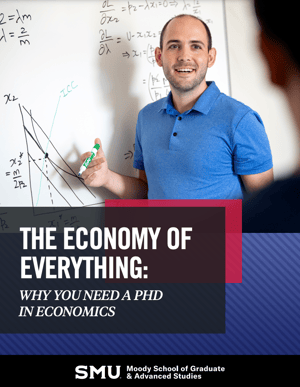
We'll email you a PDF of the eBook for your reference as you apply to graduate school.
Download The Guide!
What can i do with a phd in economics.
Economics PhDs often work in complex, high-profile positions in the corporate sector or government and frequently explore regulatory, strategic or public policies. Our resource expands on both the academic and non-academic career paths for PhD economists.
Access the Guide
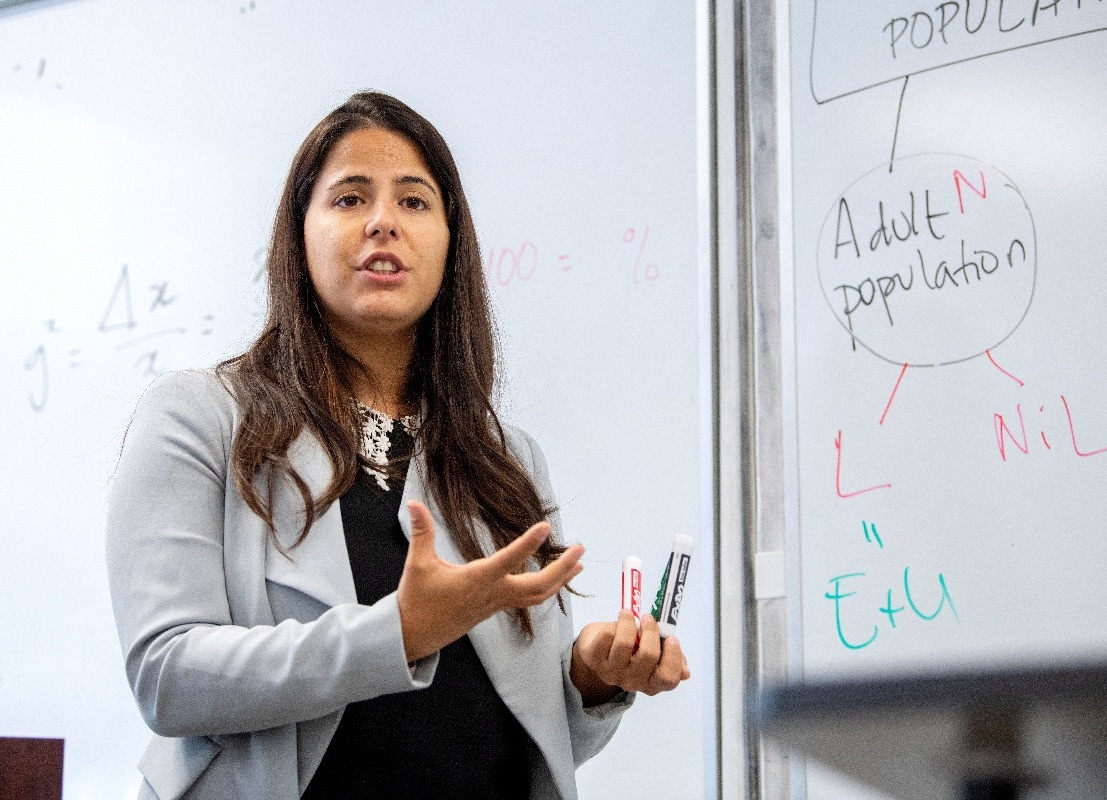
Is a PhD in Economics Worth It?
Pursuing a PhD in economics is a big investment. Even though you will have a full tuition waiver and a stipend to cover your cost of living, you must also consider the cost of lost wages during your education. This guide will help you calculate the ROI of your PhD in Economics and determine if it's the right choice for you compared to a master's in economics.
Download Our Guide
Request More Information
Would you like to learn more about your graduate program of interest or available fellowships for PhD student? Submit the form to connect with a representative from your intended department, College, or School.
Let's Chat!

Why Get an Economics Ph.D?
What the Econ Bloggers Have to Say
- U.S. Economy
- Supply & Demand
- Archaeology
- Ph.D., Business Administration, Richard Ivey School of Business
- M.A., Economics, University of Rochester
- B.A., Economics and Political Science, University of Western Ontario
I've been getting quite a few e-mails lately from people asking me if they should consider doing a Ph.D. in Economics. I wish I could help these people more, but without knowing more about them, I'm not at all comfortable giving career advice. However, I can list a few types of people who should not do graduate work in economics:
Types of People Who Have No Business in an Economics Ph.D. Program
- Not a superstar in mathematics . By mathematics, I do not mean calculus. I mean, the theorem - proof - theorem - proof type mathematics of real analysis. If you are not excellent at this type of mathematics, you will not make it to Christmas in your first year.
- Love applied work but hate theory . Do a Ph.D. in Business instead - it is half the work and when you leave you to get twice the salary. It's a no-brainer.
- Are a great communicator and teacher, but bored by research . Academic economics is set up for people who have a comparative advantage in research. Go somewhere where a comparative advantage in communication is an asset - such as a business school or into consulting.
A recent blog post by GMU Economics Prof Tyler Cowen, titled Trudie's advice to would-be economists that is an absolute must-read for anyone considering attempting a Ph.D. in Economics. I found this part particularly interesting:
Types of People Who Succeed As Academic Economists
Cowen's first two groups are relatively straight-forward. The first group includes exceptionally strong students at math who can get into top-ten schools and are willing to work long hours. The second group is those who enjoy teaching, do not mind the relatively low pay and will perform a little research. The third group, in Prof Cowen's words: "3. You do not fit either #1 or #2. Yet you have climbed out of the cracks rather than falling into them. You do something different and still have managed to make your way doing research, albeit of a different kind. You will always feel like an outsider in the profession and perhaps you will be under-rewarded...
Sadly, the chance of achieving #3 is fairly low. You need some luck and perhaps one or two special skills other than math... if you have a clearly defined "Plan B" your chance of succeeding at #3 diminishes? It is important to be fully committed." I thought my advice would be a great deal different that Dr. Cowen's. For one thing, he completed his Ph.D. in Economics and has a pretty successful career at it. My situation is a great deal different; I transferred from doing a Ph.D. in Economics to a Ph.D. in Business Administration. I do just as much economics as I did when I was in Economics, except I now work shorter hours and get paid a great deal more. So I believe I'm more likely to discourage people from going into Economics than Dr. Cowen.
High Opportunity Costs Destroy Grad School Completion Rates
Needless to say, I was surprised when I read Cowen's advice. I always hoped to fall into the #3 camp, but he's correct - in economics, it's very, very tough to do. I can't stress enough the importance of not having a plan B. Once you get into a Ph.D. program, everyone is very bright and talented and everyone is at least moderately hard working (and most could be described as workaholics). The most important factor I've seen that determines whether or not someone completes their degree is the availability of other lucrative options. If you've got nowhere else to go, you're a lot less likely to say "to heck with this, I'm leaving!" when things get really tough (and they will). The people that left the Economics Ph.D. program I was in (University of Rochester - one of those Top Ten programs Dr. Cowen discusses) weren't any more or less bright than those who stayed. But, for the most part, they were the ones with the best external options. Opportunity costs are the death of graduate school careers.
Economics Graduate School - Another Point of View
Prof. Kling also discussed the three categories on the EconLib blog, in an entry titled Why Get an Econ Ph.D.? . Here's a snippet of what he said: "I see academics as very much a status game. You worry about whether or not you have tenure, the reputation of your department, the reputation of the journals in which you publish, and so on..."
Economics as a Status Game
I would agree with all that as well. The idea of academia as a status game goes well beyond Economics; it's no different at business schools, from what I've seen.
I think an Economics Ph.D. is a terrific option for many people. But before you dive in, I think you need to ask yourself if the people described as succeeding at it sound like you. If they don't, you might want to consider a different endeavor.
- Books to Study Before Going to Graduate School in Economics
- What You Should Know Before Applying to an Economics PhD Program
- Should I Earn an Economics Degree?
- Should I Earn a PhD in Business Administration?
- Choosing an Ivy League Business School
- Choosing the Best Economics Graduate Program
- Why You Should Get a PhD in Chemistry
- How to Decide Between a Ph.D. or Psy.D. in Psychology
- What Is a Management Information Systems Degree?
- The 10 Best U.S. Business Schools
- What Is Mathematical Economics?
- What Comes After a Master's Degree?
- Should I Earn a Business Administration Degree?
- How to Get Into Business School
- Business Administration Education and Careers
- What It's Like Being a Chemist
- Work & Careers
- Life & Arts
Become an FT subscriber
Try unlimited access Only $1 for 4 weeks
Then $75 per month. Complete digital access to quality FT journalism on any device. Cancel anytime during your trial.
- Global news & analysis
- Expert opinion
- Special features
- FirstFT newsletter
- Videos & Podcasts
- Android & iOS app
- FT Edit app
- 10 gift articles per month
Explore more offers.
Standard digital.
- FT Digital Edition
Premium Digital
Print + premium digital, digital standard + weekend, digital premium + weekend.
Today's FT newspaper for easy reading on any device. This does not include ft.com or FT App access.
- 10 additional gift articles per month
- Global news & analysis
- Exclusive FT analysis
- Videos & Podcasts
- FT App on Android & iOS
- Everything in Standard Digital
- Premium newsletters
- Weekday Print Edition
- FT Weekend newspaper delivered Saturday plus standard digital access
- FT Weekend Print edition
- FT Weekend Digital edition
- FT Weekend newspaper delivered Saturday plus complete digital access
- Everything in Preimum Digital
Essential digital access to quality FT journalism on any device. Pay a year upfront and save 20%.
- Everything in Print
- Everything in Premium Digital
Complete digital access to quality FT journalism with expert analysis from industry leaders. Pay a year upfront and save 20%.
Terms & Conditions apply
Explore our full range of subscriptions.
Why the ft.
See why over a million readers pay to read the Financial Times.
International Edition
Economics Degrees: Worth it or Useless for Getting a Job?
With an estimated 13% employment growth rate for economists in the next decade, an economics degree is worth it to many.
Entry-level jobs are available for graduates with a bachelor’s degree in economics. But, to thrive in the field, many people do also go on to pursue a Master’s degree or PhD in economics.
What Is an Economics Degree?
Economics is a discipline that explores how money and the global capitalist market affects and enhances human life.
While it’s a heavily mathematical and theoretical degree, at its heart it is the study of how to help people thrive. Economics can explain the reasons that drive human behavior, reactions, and decisions.
With an economics degree, students obtain top-tier statistical and mathematical skills, including the knowledge to apply economic models and principles to problems related to finance, assets, business, or public administration.
What Jobs can you get with an Economics Degree?
Studying the financial market and social policies are some of the major components of an economics degree. As a result, it paves the way for countless job opportunities. Here is a quick look at some of the most popular jobs with a degree in economics.
Pros and Cons of an Economics Degree
If you can’t figure out if an economics degree is the right fit for you, then take a look at its pros and cons below. It’s important to consider all the positives and negatives when seeking out proper career options.
1. Benefits of an Economics Degree
Here are the benefits of having a degree in economics.
- You will develop logical and analytical thinking skills.
- The degree combines mathematics and social theory in a very interesting way.
- Optimistic job outlook. Many employers are looking to hire graduates from economics majors.
- High pay. While an entry-level position might not pay as much as you’d like, career economists often end up in high-paying positions.
2. Negatives of an Economics Degree
Just like any major out there, economics has its downsides.
- Math and statistics are the core of economic classes. If they are not your strong suit, then you probably won’t like it.
- You may need an advanced degree such as a Masters of PhD to beat the competition.
What are the Requirements for Economics Degrees?
The minimum GPA requirement in overall economics courses is usually 3.3, while in upper-division economics, you will need at least a 3.5 GPA .
Of course, these requirements will vary depending on the university you select.
For example, students who enter Berkeley as freshmen need a minimum 3.0 GPA in the prerequisite courses. For a transfer student, a minimum 2.7 GPA is necessary. So, check the requirements in the college you want to apply to.
What Economics Majors are There?
Economic majors cover topics related to economic systems and theories. This includes mathematical methods and practical knowledge that can come in handy when analyzing resources, trades, and other factors of a business.
Here are some of the majors you can go for.
What is the Average Salary for Economics Graduates?
According to the American Economic Association , the average wage for economists varies based on the major you work in.
For Applied Economics and Management, the starting salary is usually about $58,900, which can reach $140,000 in mid-career. With Econometrics, the average starting pay is $60,100, reaching $131,000 in mid-career.
Overall, in the salary race, economists generally earn more than most, but less than engineers and computer science majors. However, economics majors also have excellent employment prospects and earnings.
Skills Learned In An Economics Degree
1. soft skills.
- Problem-solving
- Critical and logical thinking
- Spoken and written communication
- Polished presentation and research skills
- Time management
- Interpersonal skills
2. Hard Skills
- Data analysis
- Cultural & commercial awareness
- Using literary and information-processing skills
- Drawing economic inferences
- Assimilating quantitative & qualitative data
Final Verdict: Are Economics Degree Worth It or Worthless?
Economics is a popular field of study for people who are interested in the practical application of mathematical and analytical thinking. It can be a challenging but worthwhile area of study if you want to work for big corporations, banks, or international companies. It pays well and will likely be an in-demand qualification for many decades to come.
Do Further Research on your Degree Choices:
- Is a Liberal Arts Degree Worth It?
- Is a Chemistry Degree Worth It?
- Is an Engineering Degree Worth It?
- Is a Business Degree Worth It?
- Is a Finance Degree Worth It?
- The 6 Types of Degrees
- 15 Jobs you can Get with a Teaching Degree
- Is a Computer Science Degree Worth It?
- Is an Economics Degree Worth It?
- 17 Types of Bachelor Degrees

Chris Drew (PhD)
Dr. Chris Drew is the founder of the Helpful Professor. He holds a PhD in education and has published over 20 articles in scholarly journals. He is the former editor of the Journal of Learning Development in Higher Education. [Image Descriptor: Photo of Chris]
- Chris Drew (PhD) https://helpfulprofessor.com/author/chris-drew-phd/ 5 Top Tips for Succeeding at University
- Chris Drew (PhD) https://helpfulprofessor.com/author/chris-drew-phd/ 50 Durable Goods Examples
- Chris Drew (PhD) https://helpfulprofessor.com/author/chris-drew-phd/ 100 Consumer Goods Examples
- Chris Drew (PhD) https://helpfulprofessor.com/author/chris-drew-phd/ 30 Globalization Pros and Cons
Leave a Comment Cancel Reply
Your email address will not be published. Required fields are marked *
- Skip to main content
- Prospective Students
- Current Students
- Apply Apply
- Follow Us

What Can I Do with a PhD in Economics?

If a graduate degree in economics is on your mind, you may wonder why someone would pursue a doctorate degree in the field. After all, many master's degrees in economics are designed to prepare students like you for myriad economics careers. But while a master's degree will help you stand out against competitors in the job. market, a PhD can open even more doors.
Earning a PhD in Economics means you have completed the highest level of education in the discipline, thereby creating nearly unlimited opportunities for any job in a related field.
What does an Economics PhD do?
Economics PhDs specialize in areas like labor economics, macroeconomics, industrial organization, or international economics and pursue careers within that specialization. For example, institutions like the World Trade Organization (WTO) — the international trade body — the International Monetary Fund (IMF) or the World Bank might seek to hire economists who have specialized in international economics.
The Federal Reserve Bank system hires lots of PhD macroeconomists. Government agencies like the Federal Trade Commission hire PhD economists specializing in industrial organization. The Census Bureau hires lots of PhD economists specializing in fields like labor economics.
These complex, high-profile positions are often found in the corporate sector or government and frequently involve exploring regulatory, strategic or public policies.
In addition to jobs in government and industry, academic economists play leading roles in the development of new ideas in economics and hold faculty positions in a variety of academic settings.
Industry Profile for Economists
The need for candidates with extensive economic knowledge and an upper-level understanding of quantitative analysis continues to grow as the government and private corporations seek to understand international competition, predict consumer behaviors and apply analysis to a rapidly changing global environment.
Industries With the Highest Levels of Employment in Economics
Nearly every entity relies on economists in some way to help research and advise, optimize results, interpret data and recommend solutions. Some of the top industries that employ economists include:
- Federal and state governments
- Management, scientific and technical consulting services
- Scientific research and development firms
- Finance and insurance companies
How to Get a Doctorate in Economics: The Econ PhD Program at SMU
The PhD program in Economics at SMU is the oldest PhD program at the university and has been providing students with rigorous training in a broad range of fundamental methodologies for conducting economic research for more than 55 years.
With a low student-to-faculty ratio in a relatively small program, the Economics PhD program at SMU allows for an open and friendly environment, careful supervision, quality contact time with faculty and individualized mentoring that can’t be matched elsewhere.
download the guide
The Economics of Everything is our guide to the department, research, graduate student funding and more.

Request more
Information.
Complete the form to reach out to us for more information
Published On
More articles, recommended articles for you, calculating roi: getting your master’s vs. phd in economics.
No matter what field they study, prospective graduate students should always consider the value of...
4 Ways to Get a Head Start on Graduate School While Pursuing your Bachelor’s
Who has the time to think about graduate school when they are still working on their bachelor’s...
Got a passion for economics? Do you want to turn that passion into a lucrative career in a growing...
Browse articles by topic
Subscribe to.

25,000+ students realised their study abroad dream with us. Take the first step today
Here’s your new year gift, one app for all your, study abroad needs, start your journey, track your progress, grow with the community and so much more.

Verification Code
An OTP has been sent to your registered mobile no. Please verify

Thanks for your comment !
Our team will review it before it's shown to our readers.

PhD in Economics: A Complete Guide
- Updated on
- Apr 26, 2023
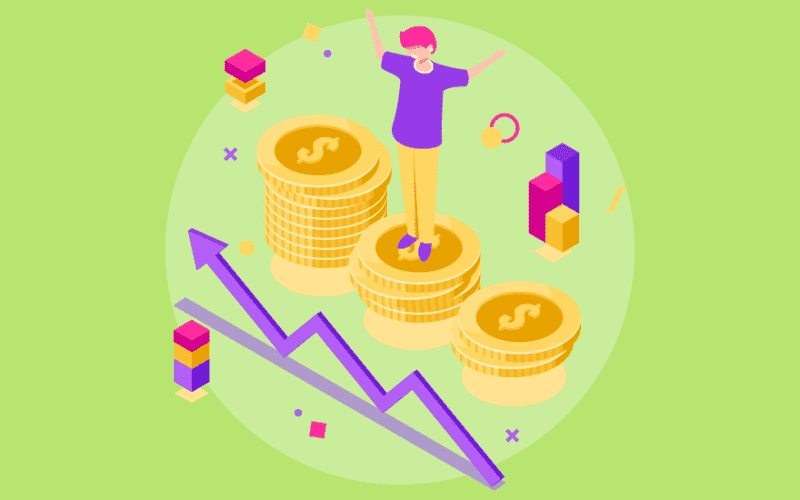
Martin Luther, a noted German professor of Theology, nailed 95 theses on a church door in Wittenberg contesting against the practices of the Roman Catholics in 1517. In the early 16th century, a thesis was a critical medium for putting one’s arguments forward. But today, it has become an essential element of academic research dissertations. A PhD is considered one of the most significant and toughest degrees in the world and a valuable asset for an academician. It helps in the publication of papers, grants awarding and other kinds of recognition in your desired field. Pursuing a PhD in Economics , you are provided with an enhanced opportunity to delve deeper into the realm of Economics and explore the diverse fields of research and academic opportunities through this degree. You can also discover work opportunities in policy-making and social impact.
In this blog, we will take you through the key features of a PhD in Economics, the top colleges offering this degree along with the eligibility details.
This Blog Includes:
Is a phd in economics after mba a good option, is a phd in economics worth it, top colleges offering phd in economics, eligibility requirements for phd in economics, application process, how to get a student visa in europe, scholarships to study in europe.
The thrill of conducting further independent scholarly research and gaining in-depth knowledge of a specialised area is one of the major reasons why PhD in Economics is a good option after an MBA. This knowledge is usually provided superficially during MBA while a PhD offers the opportunity to gain further expertise. That’s why a PhD is best for those who want to go further into research as compared to pursuing a professional degree like an MBA.
A PhD in Economics comprises courses in Econometrics and Economic Theory which is beneficial for those striving for prospects in the social and academic sectors. This degree will equip me with extensive knowledge of several economic theories and tools that are necessary for assisting governments, individuals and corporations in handling their financial data and making smart decisions based on this data. You will also develop a deeper understanding of the different economic systems utilised around the world. A PhD Economics constitutes of subjects such as:
- Economic Theory
- Applied Microeconomics
- Game Theory
- Energy Economics
- Theoretical Economics
- Labour Economics
- How to Make a Career in Economics
- Common Careers with Economics Degree
The duration of a PhD may vary from university to university around the globe and also depends on the level of your entry in the chosen institute. However, commonly a PhD in Economics takes around 4 to 5 years for full-time students depending on their point of entry into the institute. However, this will depend on the choice of subjects and the student’s performance as well.
While there are numerous colleges around the world that offer a PhD in Economics, we have listed the major universities that have been ranked at the top in the QS World University Rankings for Economics. These universities provide an excellent course structure for Economic Studies along with proficient research opportunities.
- Stanford University, USA
- University of Oxford, USA
- Yale University, USA
- University of Cambridge, USA
- Princeton University, USA
- Harvard University, USA
- London School of Economics and Political Science, UK
- University of Chicago, USA
- University of California, Berkeley (UCB), USA
To pursue a PhD in Economics, you are required to fulfil certain eligibility criteria for admissions. While these requirements vary from university to university, here are the common eligibility criteria for this course:
- A master’s degree or the international equivalent degree is always considered one of the major requirements for admission to PhD Programs. However, in some rare cases, students can move to a PhD degree right after their bachelor’s degree.
- In some universities, prior work experience, projects, theses and dissertations might be considered as well.
- Your academic performance in school and college will also be taken into account.
Because Europe is such a large continent, the procedure for applying to universities may differ from one country to the next. Here is a list of some important documents you will need on hand when applying to study in Europe:
- Keep your academic transcripts on hand as proof that you graduated from high school.
- As an international student, you will require a valid, non-expired passport.
- Admission essays, letters of recommendation, and statements of purpose
- English proficiency tests such as IELTS, TOEFL, and C1 Advanced are required.
You would be unable to enter any European country without a letter of acceptance. So you must first complete the application process and obtain a letter of acceptance from a university. The following is a brief description of the procedure for obtaining a student visa to study in Europe, which can be completed online or offline depending on the country:
Step 1: Gather all of the essential paperwork for a visa, which includes
- Photos in passport size
- Form of application
- A photo ID or proof of identification
- A high school transcript or other proof of your educational qualifications
- A police certificate demonstrating that you have not been involved in any criminal behaviour in the recent past.
- Evidence of sound financial ability
- Medical certificate stating that you are medically fit (required in some countries)
- Receipt of your payment for admission to your preferred university
- Acceptance letter
Step 2: Make contact with the consulate or embassy of the European country where you will be staying.
Step 3: On the day of the interview, they will ask for the documents you gathered earlier, so be ready. The date of the interview will be provided by the consulate or embassy.
Step 4: A study visa in Europe is usually approved between 2 to 5 weeks.
Though Erasmus Mundus scholarships provide numerous financial aid programmes for individuals wishing to study in Europe, there are numerous country-specific scholarships available. These can range from scholarships granted by a country’s institution or the national government to eager students all over the world. Take a look at the table below, which highlights some of the most well-known scholarships granted by European countries.
The “normal” length of a PhD programme in economics is 5 years. Some students complete their dissertations in less time, while others take more.
A PhD in Economics indicates that you have finished the greatest level of schooling in the discipline, which opens up practically limitless prospects for any profession in a related field.
The Department of Economic Sciences hosts a programme at the start of each academic year. To sit for the admission exam, you must have at least 55% (or a CPI of 5.5 on a 10-point scale) in your Master’s degree in Economics or a related discipline (e.g., Mathematics, Statistics).
We hope that through this blog you have gained a better clarity about PhD in Economics. If you are unsure about the right university to pursue this degree from, Leverage Edu ‘s AI tool can assist you in browsing through different universities across the globe and shortlisting an ideal university that fits your preferences and interests in the field of Economics.
Ankita Mishra
A writer with more than 10 years of experience, including 5 years in a newsroom, Ankita takes great pleasure in helping students via study abroad news updates about universities and visa policies. When not busy working you can find her creating memes and discussing social issues with her colleagues.
Leave a Reply Cancel reply
Save my name, email, and website in this browser for the next time I comment.
Contact no. *
Very useful and informative
Thank you, Grace!

Leaving already?
8 Universities with higher ROI than IITs and IIMs
Grab this one-time opportunity to download this ebook
Connect With Us
25,000+ students realised their study abroad dream with us. take the first step today..

Resend OTP in

Need help with?
Study abroad.
UK, Canada, US & More
IELTS, GRE, GMAT & More
Scholarship, Loans & Forex
Country Preference
New Zealand
Which English test are you planning to take?
Which academic test are you planning to take.
Not Sure yet
When are you planning to take the exam?
Already booked my exam slot
Within 2 Months
Want to learn about the test
Which Degree do you wish to pursue?
When do you want to start studying abroad.
September 2024
January 2025
What is your budget to study abroad?

How would you describe this article ?
Please rate this article
We would like to hear more.
Why doing a PhD is often a waste of time
The disposable academic.
The Economist
This article originally appeared in the 2010 Christmas double issue of The Economist.
On the evening before All Saints’ Day in 1517, Martin Luther nailed 95 theses to the door of a church in Wittenberg. In those days a thesis was simply a position one wanted to argue. Luther, an Augustinian friar, asserted that Christians could not buy their way to heaven. Today a doctoral thesis is both an idea and an account of a period of original research. Writing one is the aim of the hundreds of thousands of students who embark on a doctorate of philosophy (PhD) every year.
In most countries a PhD is a basic requirement for a career in academia. It is an introduction to the world of independent research — a kind of intellectual masterpiece, created by an apprentice in close collaboration with a supervisor. The requirements to complete one vary enormously between countries, universities and even subjects. Some students will first have to spend two years working on a master’s degree or diploma. Some will receive a stipend; others will pay their own way. Some PhDs involve only research, some require classes and examinations and some require the student to teach undergraduates. A thesis can be dozens of pages in mathematics, or many hundreds in history. As a result, newly minted PhDs can be as young as their early 20s or world-weary forty-somethings.
One thing many PhD students have in common is dissatisfaction. Some describe their work as “slave labour”. Seven-day weeks, ten-hour days, low pay and uncertain prospects are widespread. You know you are a graduate student, goes one quip, when your office is better decorated than your home and you have a favourite flavour of instant noodle. “It isn’t graduate school itself that is discouraging,” says one student, who confesses to rather enjoying the hunt for free pizza. “What’s discouraging is realising the end point has been yanked out of reach.”
Whining PhD students are nothing new, but there seem to be genuine problems with the system that produces research doctorates (the practical “professional doctorates” in fields such as law, business and medicine have a more obvious value). There is an oversupply of PhDs. Although a doctorate is designed as training for a job in academia, the number of PhD positions is unrelated to the number of job openings. Meanwhile, business leaders complain about shortages of high-level skills, suggesting PhDs are not teaching the right things. The fiercest critics compare research doctorates to Ponzi or pyramid schemes.
Rich pickings
For most of history even a first degree at a university was the privilege of a rich few, and many academic staff did not hold doctorates. But as higher education expanded after the second world war, so did the expectation that lecturers would hold advanced degrees. American universities geared up first: by 1970 America was producing just under a third of the world’s university students and half of its science and technology PhDs (at that time it had only 6% of the global population). Since then America’s annual output of PhDs has doubled, to 64,000.
Other countries are catching up. Between 1998 and 2006 the number of doctorates handed out in all OECD countries grew by 40%, compared with 22% for America. PhD production sped up most dramatically in Mexico, Portugal, Italy and Slovakia. Even Japan, where the number of young people is shrinking, churned out about 46% more PhDs. Part of that growth reflects the expansion of university education outside America. Richard Freeman, a labour economist at Harvard University, says that by 2006 America was enrolling just 12% of the world’s students.
But universities have discovered that PhD students are cheap, highly motivated and disposable labour. With more PhD students they can do more research, and in some countries more teaching, with less money. A graduate assistant at Yale might earn $20,000 a year for nine months of teaching. The average pay of full professors in America was $109,000 in 2009 — higher than the average for judges and magistrates.
Indeed, the production of PhDs has far outstripped demand for university lecturers. In a recent book, Andrew Hacker and Claudia Dreifus, an academic and a journalist, report that America produced more than 100,000 doctoral degrees between 2005 and 2009. In the same period there were just 16,000 new professorships. Using PhD students to do much of the undergraduate teaching cuts the number of full-time jobs. Even in Canada, where the output of PhD graduates has grown relatively modestly, universities conferred 4,800 doctorate degrees in 2007 but hired just 2,616 new full-time professors. Only a few fast-developing countries, such as Brazil and China, now seem short of PhDs.
A short course in supply and demand
In research the story is similar. PhD students and contract staff known as “postdocs”, described by one student as “the ugly underbelly of academia”, do much of the research these days. There is a glut of postdocs too. Dr Freeman concluded from pre-2000 data that if American faculty jobs in the life sciences were increasing at 5% a year, just 20% of students would land one. In Canada 80% of postdocs earn $38,600 or less per year before tax — the average salary of a construction worker. The rise of the postdoc has created another obstacle on the way to an academic post. In some areas five years as a postdoc is now a prerequisite for landing a secure full-time job.
These armies of low-paid PhD researchers and postdocs boost universities’, and therefore countries’, research capacity. Yet that is not always a good thing. Brilliant, well-trained minds can go to waste when fashions change. The post-Sputnik era drove the rapid growth in PhD physicists that came to an abrupt halt as the Vietnam war drained the science budget. Brian Schwartz, a professor of physics at the City University of New York, says that in the 1970s as many as 5,000 physicists had to find jobs in other areas.
In America the rise of PhD teachers’ unions reflects the breakdown of an implicit contract between universities and PhD students: crummy pay now for a good academic job later. Student teachers in public universities such as the University of Wisconsin-Madison formed unions as early as the 1960s, but the pace of unionisation has increased recently. Unions are now spreading to private universities; though Yale and Cornell, where university administrators and some faculty argue that PhD students who teach are not workers but apprentices, have resisted union drives. In 2002 New York University was the first private university to recognise a PhD teachers’ union, but stopped negotiating with it three years later.
In some countries, such as Britain and America, poor pay and job prospects are reflected in the number of foreign-born PhD students. Dr Freeman estimates that in 1966 only 23% of science and engineering PhDs in America were awarded to students born outside the country. By 2006 that proportion had increased to 48%. Foreign students tend to tolerate poorer working conditions, and the supply of cheap, brilliant, foreign labour also keeps wages down.
A PhD may offer no financial benefit over a master’s degree. It can even reduce earnings
Proponents of the PhD argue that it is worthwhile even if it does not lead to permanent academic employment. Not every student embarks on a PhD wanting a university career and many move successfully into private-sector jobs in, for instance, industrial research. That is true; but drop-out rates suggest that many students become dispirited. In America only 57% of doctoral students will have a PhD ten years after their first date of enrolment. In the humanities, where most students pay for their own PhDs, the figure is 49%. Worse still, whereas in other subject areas students tend to jump ship in the early years, in the humanities they cling like limpets before eventually falling off. And these students started out as the academic cream of the nation. Research at one American university found that those who finish are no cleverer than those who do not. Poor supervision, bad job prospects or lack of money cause them to run out of steam.
Even graduates who find work outside universities may not fare all that well. PhD courses are so specialised that university careers offices struggle to assist graduates looking for jobs, and supervisors tend to have little interest in students who are leaving academia. One OECD study shows that five years after receiving their degrees, more than 60% of PhDs in Slovakia and more than 45% in Belgium, the Czech Republic, Germany and Spain were still on temporary contracts. Many were postdocs. About one-third of Austria’s PhD graduates take jobs unrelated to their degrees. In Germany 13% of all PhD graduates end up in lowly occupations. In the Netherlands the proportion is 21%.
A very slim premium
PhD graduates do at least earn more than those with a bachelor’s degree. A study in the Journal of Higher Education Policy and Management by Bernard Casey shows that British men with a bachelor’s degree earn 14% more than those who could have gone to university but chose not to. The earnings premium for a PhD is 26%. But the premium for a master’s degree, which can be accomplished in as little as one year, is almost as high, at 23%. In some subjects the premium for a PhD vanishes entirely. PhDs in maths and computing, social sciences and languages earn no more than those with master’s degrees. The premium for a PhD is actually smaller than for a master’s degree in engineering and technology, architecture and education. Only in medicine, other sciences, and business and financial studies is it high enough to be worthwhile. Over all subjects, a PhD commands only a 3% premium over a master’s degree.
Dr Schwartz, the New York physicist, says the skills learned in the course of a PhD can be readily acquired through much shorter courses. Thirty years ago, he says, Wall Street firms realised that some physicists could work out differential equations and recruited them to become “quants”, analysts and traders. Today several short courses offer the advanced maths useful for finance. “A PhD physicist with one course on differential equations is not competitive,” says Dr Schwartz.
Many students say they are pursuing their subject out of love, and that education is an end in itself. Some give little thought to where the qualification might lead. In one study of British PhD graduates, about a third admitted that they were doing their doctorate partly to go on being a student, or put off job hunting. Nearly half of engineering students admitted to this. Scientists can easily get stipends, and therefore drift into doing a PhD. But there are penalties, as well as benefits, to staying at university. Workers with “surplus schooling” — more education than a job requires — are likely to be less satisfied, less productive and more likely to say they are going to leave their jobs.
Academics tend to regard asking whether a PhD is worthwhile as analogous to wondering whether there is too much art or culture in the world. They believe that knowledge spills from universities into society, making it more productive and healthier. That may well be true; but doing a PhD may still be a bad choice for an individual.
The interests of academics and universities on the one hand and PhD students on the other are not well aligned. The more bright students stay at universities, the better it is for academics. Postgraduate students bring in grants and beef up their supervisors’ publication records. Academics pick bright undergraduate students and groom them as potential graduate students. It isn’t in their interests to turn the smart kids away, at least at the beginning. One female student spoke of being told of glowing opportunities at the outset, but after seven years of hard slog she was fobbed off with a joke about finding a rich husband.
Monica Harris, a professor of psychology at the University of Kentucky, is a rare exception. She believes that too many PhDs are being produced, and has stopped admitting them. But such unilateral academic birth control is rare. One Ivy-League president, asked recently about PhD oversupply, said that if the top universities cut back others will step in to offer them instead.
Noble pursuits
Many of the drawbacks of doing a PhD are well known. Your correspondent was aware of them over a decade ago while she slogged through a largely pointless PhD in theoretical ecology. As Europeans try to harmonise higher education, some institutions are pushing the more structured learning that comes with an American PhD.
The organisations that pay for research have realised that many PhDs find it tough to transfer their skills into the job market. Writing lab reports, giving academic presentations and conducting six-month literature reviews can be surprisingly unhelpful in a world where technical knowledge has to be assimilated quickly and presented simply to a wide audience. Some universities are now offering their PhD students training in soft skills such as communication and teamwork that may be useful in the labour market. In Britain a four-year NewRoutePhD claims to develop just such skills in graduates.
The interests of universities and tenured academics are misaligned with those of PhD students
Measurements and incentives might be changed, too. Some university departments and academics regard numbers of PhD graduates as an indicator of success and compete to produce more. For the students, a measure of how quickly those students get a permanent job, and what they earn, would be more useful. Where penalties are levied on academics who allow PhDs to overrun, the number of students who complete rises abruptly, suggesting that students were previously allowed to fester.
Many of those who embark on a PhD are the smartest in their class and will have been the best at everything they have done. They will have amassed awards and prizes. As this year’s new crop of graduate students bounce into their research, few will be willing to accept that the system they are entering could be designed for the benefit of others, that even hard work and brilliance may well not be enough to succeed, and that they would be better off doing something else. They might use their research skills to look harder at the lot of the disposable academic. Someone should write a thesis about that.

Written by The Economist
Insight and opinion on international news, politics, business, finance, science, technology, books and arts.
More from The Economist and The Economist
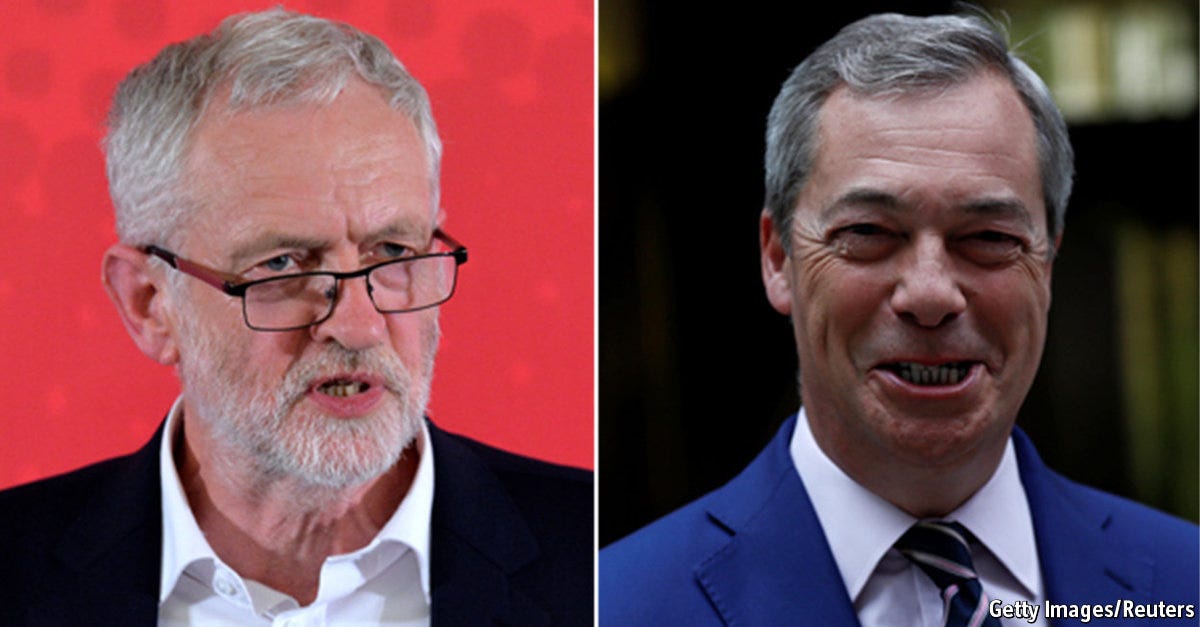
Is The Economist left- or right-wing?
Neither. we consider ourselves to be in the “radical centre”.
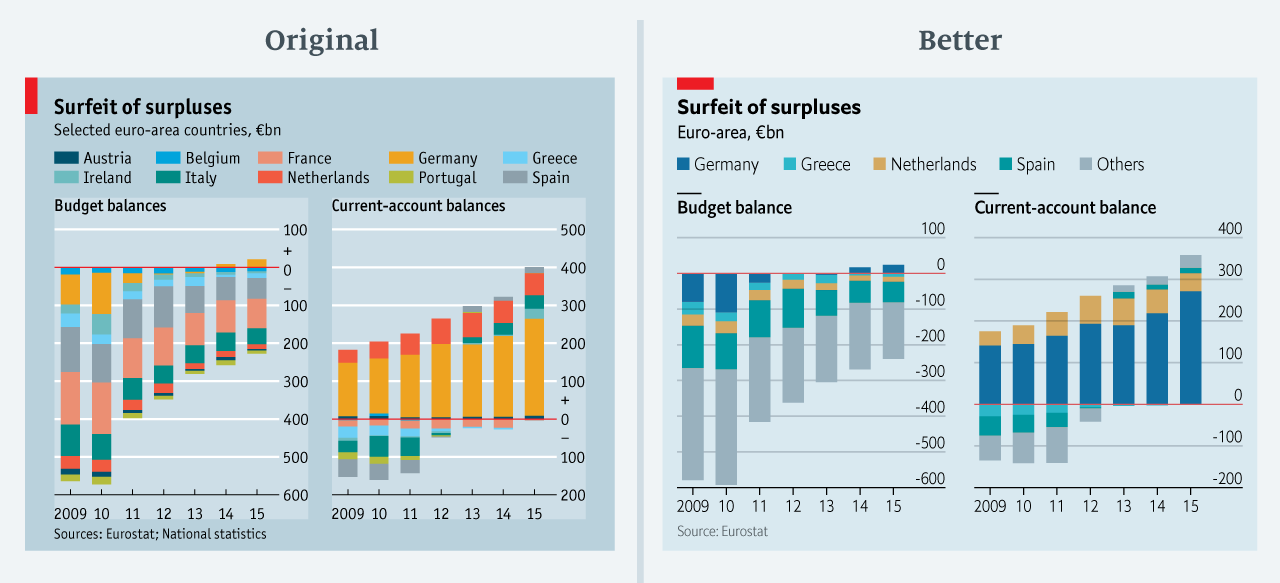
Mistakes, we’ve drawn a few
Learning from our errors in data visualisation.
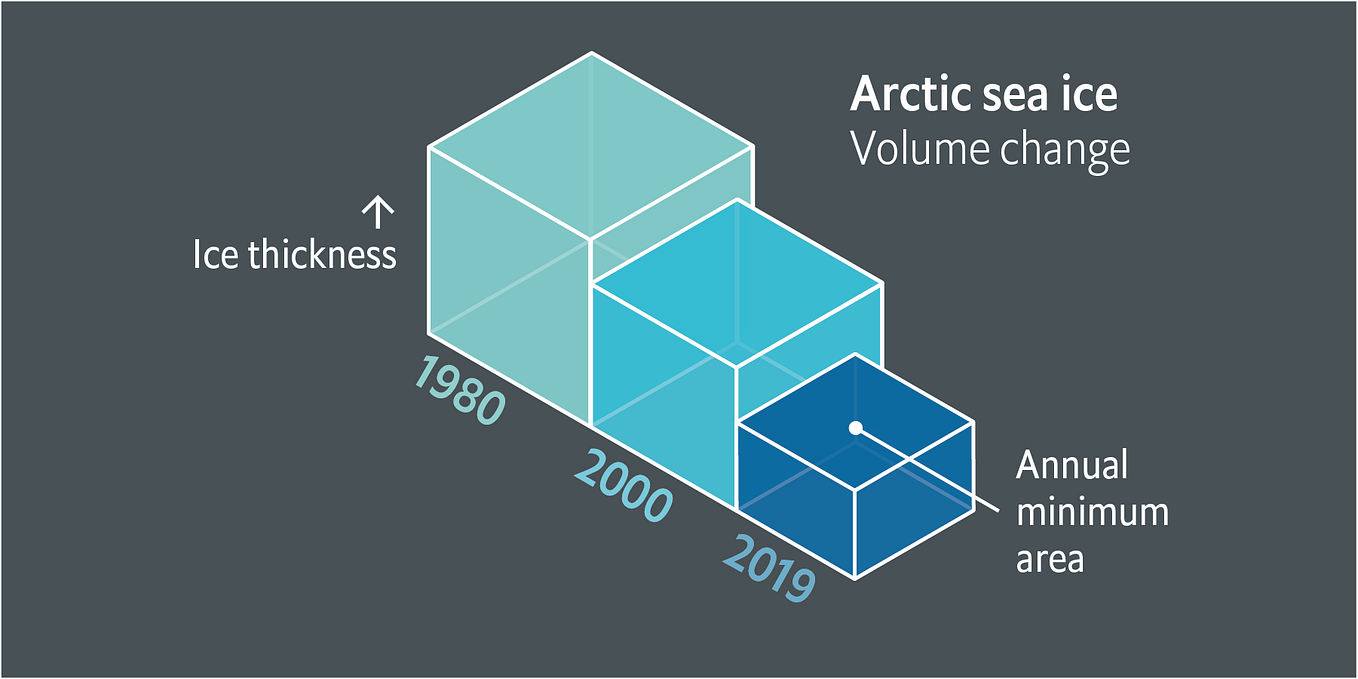
Rosamund Pearce
Why you sometimes need to break the rules in data viz
Best practices help us to avoid common pitfalls in data visualisation — but we shouldn’t follow them blindly.

Why are The Economist’s writers anonymous?
Enabling our writers to speak with a collective voice, recommended from medium.
Elizabeth Shaw
The Quiet Crisis of Loneliness
The intimate affliction of today’s disconnected world.
Emily Smith
From Script to Stage: The Playwright’s Journey
The process of bringing a script to life on stage is often an arduous one, requiring equal parts creativity, tenacity, and sheer….
How to Find a Mentor
Stories to Help You Live Better
Stories to Help You Level-Up at Work
Predictive Modeling w/ Python

Hugh McGuire
Why can’t we read anymore?
Or, can books save us from what digital does to our brains.

Jason Polak
The worst problem in higher education today
I explain how the worst problem in higher education today is its specialized nature..

Tirendaz AI
Level Up Coding
How to Use ChatGPT in Daily Life?
Save time and money using chatgpt.
Beck Novaes
The Curse of Knowledge: The Danger of Studying Too Much
How to prevent studies from turning you into a fool.
Text to speech
Want to Get your Dissertation Accepted?
Discover how we've helped doctoral students complete their dissertations and advance their academic careers!
Join 200+ Graduated Students

Get Your Dissertation Accepted On Your Next Submission
Get customized coaching for:.
- Crafting your proposal,
- Collecting and analyzing your data, or
- Preparing your defense.
Trapped in dissertation revisions?
Is a phd worth it, published by steve tippins on may 26, 2020 may 26, 2020.
Last Updated on: 30th August 2022, 04:22 am
Is a PhD worth it? That depends on who’s asking. If you’re talking about the educational benefits, the opportunity to make new discoveries, or the chance to make a difference, then the answer is almost always a resounding “yes.” However, if you’re talking about purely economic benefits, the answer is almost always “no.” A combination of them both? It depends.
In this article, I’ll explore two answers to the question, “Is a PhD worth it?” and the reasons for each. Ultimately, whether a PhD is worth it for you depends on your reasons for getting it. So let’s dive into those.
A PhD is worth it when what you gain–by way of knowledge, experience, credentials, and opportunities–is more valuable to you than what you gave up in order to get it. In terms of time, money, cost to relationships, and stress, a PhD costs an incredible amount. So what makes it worth the cost? Let’s explore that below.
When a PhD Is Worth It
Here are some of the reasons a PhD is worth it for some people.

Is a PhD worth it if you’re motivated by learning? Absolutely. A PhD program is one of the most intense learning opportunities available anywhere. If you are passionate about a certain subject and want to work at a high level in the field, then a PhD program is the right bet.
As one former PhD candidate said to me, “There’s so much learning that happens. I didn’t finish but I still think it was worth it to do the program because of all the things I learned about my subject area and about research and about myself. All the things I learned about how I related to the topic.”
Critical Thinking
When you go through a PhD program, you become a much better consumer of information–and not just academic information. You begin to question, “where did that come from? What’s the source?” This includes advertisements, news, and anything else you may be reading or listening to.
You also understand what studies are actually saying. You’re better able to understand research and consider its implications and shortcomings.
Respect

Just having a PhD affords you a level of respect and assumed expertise that is difficult to come by. We used to have calling cards–that was the way people introduced themselves to a new place, which would come along with recommendations from friends. Now a PhD takes the place of that.
Generally, people have positive assumptions about you if you have those letters after your name. You’re controlling what people think about you just by having those three letters after your name.
For example, If you want to publish a book, having a PhD in the field you’re writing about you’re much more likely to be published. And once you’re published, more likely to be promoted, interviewed about your book, etc. Having a PhD can also open you up to grant opportunities, giving you credibility for these types of opportunities.
Social Change
For better of for worse, having this credential is one of the ways that people run the world. It gives you more social capital and economic power. If used for the betterment of the community, this can be a huge opportunity to affect positive social change. It puts you in a position to make changes to some things. In education, it can put you into leadership positions.

Besides being recognized as an expert, having a PhD can also give you the confidence to go out and do things that you wouldn’t have done before. As one of society’s experts, you are trusted to be on the cutting edge of your area of expertise. Whether that means starting a business or non-profit, writing a book, giving talks, or something entirely different, you can make great strides. It’s not just because society trusts you, but having a PhD increases your trust of yourself–and your moral responsibility to use the power of your position to benefit others.
Ability to Get Through Anything
A PhD program is one of the most challenging experiences you can put yourself through . By going through the rigorous process of getting a PhD, you gain the confidence and experience necessary to handle challenges in just about every other area as well.

Academic Career

If you want an academic career today, you’ll pretty much need a PhD. Community colleges used to hire people with master’s degrees. Now when they’re searching, they pretty much ask for a PhD. While a PhD can’t guarantee an academic career, it is a prerequisite.
Non-Academic jobs
If you want more flexibility in the work that you do, a PhD helps. Many PhDs go on to do consulting work in their field.
A lot of organizations need people with PhDs for accreditation purposes. This is true of colleges, of course. But there are also other organizations, like consulting firms. They need a high number of people with PhDs to give the organization credibility.
Intrinsic Reward
A PhD program is a level of rigor that not many people get to. Finishing it produces an intrinsic reward that comes from accomplishing something extremely difficult. There’s a feeling of accomplishment that you don’t get with anything else. It’s not an easy thing to do, and there’s some reward in that.
Hack Your Dissertation
5-Day Mini Course: How to Finish Faster With Less Stress
Interested in more helpful tips about improving your dissertation experience? Join our 5-day mini course by email!
When a PhD Is not Worth It
The rewards for a PhD may be great, but it can also cost an incredible amount, in all areas of your life. Let’s consider these costs.
The Cost of Not Finishing

Fifty percent of the people who start a PhD program don’t finish. Nobody goes into it thinking “i’m not going to finish,” but half of them don’t. It’s incredibly expensive to not finish since you don’t get the payoff that comes with the degree.
“I got a lot of psychic rewards, but I’m still paying lots of money in student loans and will be for the rest of my life–and will be for the rest of my life,” said one former PhD candidate who did not complete her program.
Will you be totally devastated financially or otherwise if you don’t finish? That’s a very real possibility, so it’s important to consider what the consequences would be, even if you fully intend to finish. You have to ask yourself that question, is it worth it if I don’t end up with a degree?
Family Sacrifice
Sacrifice to the family is a big reason why a PhD program may not be worth it. Some people get divorced during the process–not only because it’s so much time away from the family but also because the person getting the doctorate is very intellectually focused, and that can be hard on a relationship .
If you have children, the sacrifice can be double. You will miss baseball games, recitals, vacations, and weekends. You’ll be in your PhD program for several years, and you won’t be able to be as present in your children’s lives for that time period. While many parents do successfully complete PhD programs and manage to be wonderful, loving parents at the same time, it’s an incredibly difficult balancing act.

Foregone Earnings
When in a PhD program, you don’t get to work full time at your regular job for around 3-6 years. There are PhD programs that allow you to work while you’re doing it, but it’s very difficult. And if you have a family too? That’s incredibly difficult. There are some professions where people make enough yearly income where it’s not financially worth the lost income to get a PhD. That’s why you don’t see many Accounting PhDs.
Proving Yourself
If you’re getting a PhD in order to prove to parents or an ex-boyfriend that you have value, that’s not going to get you through it. It doesn’t carry you through the whole degree. It might give you a lot of energy at the beginning, but it won’t last for three or six years. It won’t provide you with the resilience and fortitude necessary to make it through the toughest times. And anyway, counseling is cheaper.
Other Costs
I know from experience that getting a PhD increases your cheez-it consumption. Alright, that may just have been me. But it is important to consider what the costs will be to you in your particular situation. Give these costs serious consideration.
Is a PhD Worth It? An Economic Perspective

Will your salary go up enough to justify the cost? The answer is almost universally “no.”
If you’re going to continue working for the same company, you could ask them how much more your pay would be (if they would raise it) if you had a PhD. You could amortize that over how many years you plan to work.
However, generally speaking, the economic gains do not justify the economic costs .
If you can combine the economic and psychic reasons, it can be worth it for some people. But if you’re just doing the numbers in terms of how much you’ll make and how much you’ll pay, it’s probably not worth it.
Getting a PhD will likely boost your income and it does give you more options, but that may not justify the costs, economically speaking. Unless there are other bolstering reasons, I’d say it’s not worth it.
Steve Tippins
Steve Tippins, PhD, has thrived in academia for over thirty years. He continues to love teaching in addition to coaching recent PhD graduates as well as students writing their dissertations. Learn more about his dissertation coaching and career coaching services. Book a Free Consultation with Steve Tippins
Related Posts

BIPOC Academics Matter: Diversity in Academia Is Long Overdue
We at Beyond PhD Coaching firmly believe that diversifying academia is both necessary and important – and well past overdue. There’s no denying that higher education equals more power in society. This power has been Read more…

Academic Arrogance: Dismantling a Culture of Harm
Academics are like polar bears. We live alone; we hibernate. If you walk down the halls of academic offices, you’ll find that almost all of the doors are shut. We live a solitary existence, occasionally Read more…

How to Be a Good PhD Student
If you’re curious about how to be a good PhD student, this article is a good place to start. As a professor for over 30 years, much of that as a Dissertation Committee Chair, I’ve Read more…
Make This Your Last Round of Dissertation Revision.
Learn How to Get Your Dissertation Accepted .
Discover the 5-Step Process in this Free Webinar .
Almost there!
Please verify your email address by clicking the link in the email message we just sent to your address.
If you don't see the message within the next five minutes, be sure to check your spam folder :).

« RETURN TO NEWS
U.S. News & World Report: Deese College No. 1 HBCU Graduate Business School
By Todd Simmons / 04/10/2024 College of Business and Economics , The Graduate College
- 4-H and Youth Development News
- Academic Affairs News
- Accounting and Finance News
- Administration and Instructional Services News
- Admissions News
- Agribusiness, Applied Economics and Agriscience Education News
- Agricultural and Natural Resources News
- Alumni News
- Animal Sciences News
- Applied Engineering Technology News
- Athletics News
- Biology News
- Built Environment News
- Business and Finance News
- Business Education News
- Chancellor's Speaker Series
- Chancellors Town Hall Series
- Chemical, Biological, and Bio Engineering News
- Chemistry News
- Civil, Architectural and Environmental Engineering News
- College News
- Community and Rural Development News
- Computational Science and Engineering News
- Computer Science News
- Computer Systems Technology News
- Cooperative Extension News
- Counseling News
- Criminal Justice News
- Deese College News
- Economics News
- Educator Preparation News
- Electrical and Computer Engineering News
- Employees News
- Energy and Environmental Systems News
- English Department News
- Family and Consumer Sciences News
- Graphic Design Technology News
- Hairston College News
- Headlines News
- History & Political Science News
- Honors College News
- Human Resources News
- Industrial and Systems Engineering News
- Information Technology Services News
- Innovation Station News
- Journalism & Mass Communication
- Kinesiology News
- Leadership Studies and Adult Education News
- Liberal Studies News
- Library News
- Magazine News
- Management News
- Marketing News
- Mathematics News
- Mechanical Engineering News
- Media Spotlight News
- Natural Resources and Environmental Design News
- News Categories
- Nursing News
- Psychology News
- Research and Economic Development News
- Social Work News
- Student Affairs News
- Students News
- The Graduate College News
- Transportation & Supply Chain
- University Advancement News
- Visual & Performing Arts News

EAST GREENSBORO, N.C. (April 10, 2024) – The Willie A. Deese College of Business and Economics at North Carolina Agricultural and Technical State University is the No. 1 business school among America’s historically Black colleges and universities (HBCUs), according to U.S. News & World Report’s “Best Graduate Colleges” rankings, released Tuesday.
The Deese College has now appeared in the Top 100 for four consecutive years, coming in at a tie for No. 79 with the University of Detroit Mercy, a private, Roman Catholic campus. Clark Atlanta University (No. 93, tie) is the only other ranked HBCU. Howard, with which N.C. A&T was tied last year, is unranked this year.
Among North Carolina schools, A&T only trails Duke University, the University of North Carolina at Chapel Hill and North Carolina State University. The college is named for A&T alumnus Willie A. Deese, who served prominently as president of global manufacturing for the pharmaceutical giant, Merck. Now retired, Deese continues to play a prominent role at his alma mater.
“We’re delighted that our Deese College continues to factor so prominently nationally among graduate business schools,” said Lisa Owens-Jackson, Ph.D., interim dean of the Deese College. “Our ranking this year is an honest reflection of the quality of our MBA programs, the excellence of our students and our graduates’ career placement success.”
A&T’s fast-growing master’s and doctoral programs in computer science moved into a tie for No. 163 nationally, up eight positions from last year. A&T ranks No. 7 nationally in graduation of African American master’s graduates in computer science and No. 1 among HBCUs.
Other nationally ranked A&T graduate programs remain in the same positions as last year, owing to multiple factors at U.S. News & World Report . The magazine encountered data issues with its Best Engineering Programs list and has postponed new rankings until that is resolved.
Ranked programs in rehabilitation counseling, biological sciences, earth sciences and mathematics maintained their 2023 positions, as U.S. News has not published new rankings data for those disciplines. Master’s and doctoral rehabilitation counseling programs in the College of Education continue to be A&T’s most highly ranked graduate programs, coming in at No. 46 (tie) nationally.
With nearly 1,700 master’s and doctoral students, A&T continues to grow at the graduate student level. As America’s most affordable doctoral research university, it offers outstanding academic quality at an exceptional price and strong connections to industry. According to U.S. News’ most recent salary rankings, graduates earn the second-highest starting salaries of any campus in the University of North Carolina System.
Media Contact Information: [email protected]
Latest News

04/10/2024 in College of Business and Economics , The Graduate College

N.C. A&T’s Jazz Ensemble Presents Spring Concert Featuring Tunes from Miles Davis
04/09/2024 in College of Arts, Humanities and Social Sciences

N.C. A&T Chancellor Search Advisory Committee to Hold Meeting April 15

- Arlington Report
Free. Fair. Local.
Arlington City Council candidates address public safety, economic development plans in forum

Share this:
- Click to share on Facebook (Opens in new window)
- Click to share on X (Opens in new window)
- Click to share on LinkedIn (Opens in new window)
- Click to share on WhatsApp (Opens in new window)
- Click to email a link to a friend (Opens in new window)
- Click to print (Opens in new window)

Arlington City Council candidates laid out their platforms during a forum organized by the Greater Arlington Chamber of Commerce Wednesday morning.
Candidates for the four council races – two of which are contested – had nine minutes to answer prepared questions about topics including economic development, creating a more equitable city and small business support.
Multiple candidates listed public safety among their chief concerns in the race.
“Crime is low in Arlington, but we need to make sure as we grow, we keep it low,” said Mauricio Galante , candidate for District 1.
Galante said he would prioritize the completion of the police substation in north Arlington that voters approved during last May’s bond election and encourage city government to invest in crime prevention technology.
Galante is one of three candidates for the open North Arlington race. His opponents are Tim Goss and Jacob Franklin .
As incumbent District 7 candidate Bowie Hogg sees it, the most dangerous parts of the city are its intersections as motorists run red lights.
“You hear from multiple residents, we see hotspots in the city. People are running lights, they’re driving crazy, and do have to increase the patrol,” he said.
Chris “Dobi” Dobson , who is running against Hogg for the at-large seat, did not attend the forum.
Incumbent Raul Gonzalez , who is running unopposed for District 2, said his two main issues for his third and final term in office are strong neighborhoods and crime.
“We’re adding more police to be on patrol. Our crime rates are down; they can always get better. People have to feel safe. They have to be heard,” Gonzalez said.
Early voting runs April 22-30 for the May 4 election.
Growth, development, infrastructure
With less than 4,000 acres of vacant and developable land left in the city, both current and future city council members will continue to face important decisions about Arlington’s continued growth.
Goss said north Arlington residents are more interested in bringing in higher-paying jobs, support for small businesses and bringing in more restaurants and retailers.
“It’s become apparent that north Arlington has reached its limit for multifamily housing. Residents overwhelmingly oppose any further apartment development at this juncture. Doesn’t mean they won’t want it in the future, but right now, they’re wanting a different focus,” Goss said.
Long Pham , incumbent District 6 council member, said the city can work with developers to find spaces to build more housing – and different types of it – to curb rising housing costs.
“Affordable housing, that’s kind of a misnomer. I think now, you talk about attainable housing. Can you do that?” Pham said.
Pham is running unopposed.
Franklin said if elected, he would encourage investment in public transportation as well as affordable housing. He said improving walkability in the city and more transit access would help people be able to visit and support local businesses.
“We can also make sure that residents’ basic needs are met so they can have the extra funds to go out and spend on businesses and keep our community growing,” he said.
Small businesses, economic development
Several candidates said the city should help small businesses compete for city contracts.
Goss said the city could establish a preference for locally owned businesses during the city contract procurement process.
“By prioritizing local businesses and procurement, cities can not only stimulate economic development within their own community but foster a sense of belonging and pride with their residents,” he said.
Galante said the city and chamber provides multiple resources for local businesses and should continue to do so. Businesses can also support one another through collaboration – advertising for one another and partnering for sales and events.
“It’s so important to create that web of cross-promoting. It strengthens everybody’s business in the city,” he said.
Galante added that the city should look to simplify regulatory and permitting processes.
“When somebody is opening a business or investing in the city, they need to know how long it takes,” he said.
Got a tip? Email Kailey Broussard at [email protected] .
Republish This Story
Noncommercial entities may republish our articles for free by following our guidelines. For commercial licensing, please email [email protected].
Republish this article

This work is licensed under a Creative Commons Attribution-NoDerivatives 4.0 International License .
- Look for the "Republish This Story" button underneath each story. To republish online, simply click the button, copy the html code and paste into your Content Management System (CMS). Do not copy stories straight from the front-end of our web-site.
- You are required to follow the guidelines and use the republication tool when you share our content. The republication tool generates the appropriate html code.
- You can’t edit our stories, except to reflect relative changes in time, location and editorial style.
- You can’t sell or syndicate our stories.
- Any web site our stories appear on must include a contact for your organization.
- If you use our stories in any other medium — for example, newsletters or other email campaigns — you must make it clear that the stories are from the Fort Worth Report. In all emails, link directly to the story at fortworthreport.org and not to your website.
- If you share our stories on social media, please tag us in your posts using @FortWorthReport on Facebook and @FortWorthReport on Twitter.
- You have to credit Fort Worth Report. Please use “Author Name, Fort Worth Report” in the byline. If you’re not able to add the byline, please include a line at the top of the story that reads: “This story was originally published by Fort Worth Report” and include our website, fortworthreport.org .
- Our stories may appear on pages with ads, but not ads specifically sold against our stories.
- You can only publish select stories individually — not as a collection.
by Kailey Broussard | KERA, Arlington Report April 10, 2024
This <a target="_blank" href="https://fortworthreport.org/2024/04/10/arlington-city-council-candidates-address-public-safety-economic-development-plans-in-forum-2/">article</a> first appeared on <a target="_blank" href="https://fortworthreport.org">Arlington Report</a> and is republished here under a Creative Commons license.<img src="https://i0.wp.com/fortworthreport.org/wp-content/uploads/2021/04/cropped-favicon.png?fit=150%2C150&quality=80&ssl=1" style="width:1em;height:1em;margin-left:10px;"><img id="republication-tracker-tool-source" src="https://fortworthreport.org/?republication-pixel=true&post=121661" style="width:1px;height:1px;">
We've recently sent you an authentication link. Please, check your inbox!
Sign in with a password below, or sign in using your email .
Get a code sent to your email to sign in, or sign in using a password .
Enter the code you received via email to sign in, or sign in using a password .
Subscribe to our newsletters:
- Weekend Worthy Events (Weekly)
- Green Report (Monthly Environment News) testtest test tes
- News Alerts (Occasional)
- Sponsored Emails
- Event Invitations (Occasional)
- The Gov't Report (Weekly)
- The School Report (Weekly)
- The Business Report (Weekly)
- Weekend Reader (Sat)
- Daily Report (Mon-Fri)
- Fort Worth Report
Sign in with your email
Lost your password?
Try a different email
Send another code
Sign in with a password
Privacy Policy
- Assistant Professor / Lecturer
- Senior Researcher / Group Leader
- Researcher / Analyst
- Research Assistant / Technician
- Administration
- Executive / Senior Industry Position
- Mid-Level Industry Position
- Junior Industry Position
- Graduate / Traineeship
- Practitioner / Consultant
- Summer Schools
- Online Kurse
- Weiterbildung
- Zusatzausbildung
- PhD-Studiengänge
- Master-Studiengänge
- MBP-Studiengänge
- Bachelor-Studiengänge
- All Studiengänge
- Remote/Hybrid Jobs
- Online Programs
- Online/Hybrid Conferences
- Fellowships
- Postgraduate Scholarships
- Undergraduate Scholarships
- Prizes & Contests
- Financial Aid
- Research/Project Funding
- Other Funding
- All Stipendien
- Konferenzen
- Ausstellungen / Messen
- All Konferenzen
- VWL-Lexikon A-Z
- Karriereberatung
- Study Advice
- Work Abroad
- Studium im Ausland
- Campus Reviews
- Recruiter Advice
- Universität
- Business School
- Bank/Zentralbank
- Unternehmen
- Beratung/Recht
- Verband/NGO
- Regierungsinstitut
- All EconDirectory
- 📖 INOMICS Handbook
Alle Kategorien
- Statistiken
Alle Disziplinen
- Studiengänge
- All VWL-Lexikon A-Z
- EconDirectory
- All 📖 INOMICS Handbook

INOMICS Gehaltsbericht
Lohnt sich ein doktortitel in wirtschaftswissenschaften die phd-prämie.
Read a summary or generate practice questions using the INOMICS AI tool
Studierende der Wirtschaftswissenschaften fragen sich oft, ob ein Doktortitel der richtige Schritt für sie ist. Schließlich kann man auch mit einem Master-Abschluss einen guten Job in den Wirtschaftswissenschaften bekommen. Wir haben dieses Thema bereits aus verschiedenen Blickwinkeln beleuchtet und hilfreiche Ratschläge dazu gegeben, welchen Abschluss man als Wirtschaftswissenschaftler braucht , ob man einen Doktortitel erwerben sollte und sogar, welche Arten von Wirtschaftswissenschaftlern am besten bezahlt werden . Dank der Daten des INOMICS-Gehaltsberichts 2023 können wir die Gehaltsvorteile eines promovierten Wirtschaftswissenschaftlers auf dem heutigen Arbeitsmarkt genauer unter die Lupe nehmen. Dies wird Ihnen helfen zu entscheiden, ob sich ein Doktortitel in Wirtschaftswissenschaften für Ihre eigene Karriere lohnt.
Es überrascht vielleicht nicht, dass der typische promovierte Wirtschaftswissenschaftler mehr verdient als der typische Wirtschaftswissenschaftler mit "nur" einem Master-Abschluss. Aber wie viel mehr? Lohnt sich ein Doktoratsstudium der Wirtschaftswissenschaften auf lange Sicht?
Die kurze Antwort: Ja. Die Daten des INOMICS Salary Report zeigen, dass promovierte Wirtschaftswissenschaftler im Jahr 2023 im Durchschnitt 96% mehr verdienen als Wirtschaftswissenschaftler mit einem Master-Abschluss. Dabei handelt es sich um weltweite Statistiken, die aus der gesamten Breite der INOMICS-Gehaltserhebung stammen.
Der Nutzen eines Doktortitels in Wirtschaftswissenschaften ist je nach Region unterschiedlich. Abbildung 1 vergleicht die "Verdienstprämie", die ein promovierter Wirtschaftswissenschaftler im Vergleich zu Wirtschaftswissenschaftlern mit einem Master-Abschluss in der ganzen Welt hat, unter Verwendung der Daten der INOMICS Gehaltserhebung 2023.
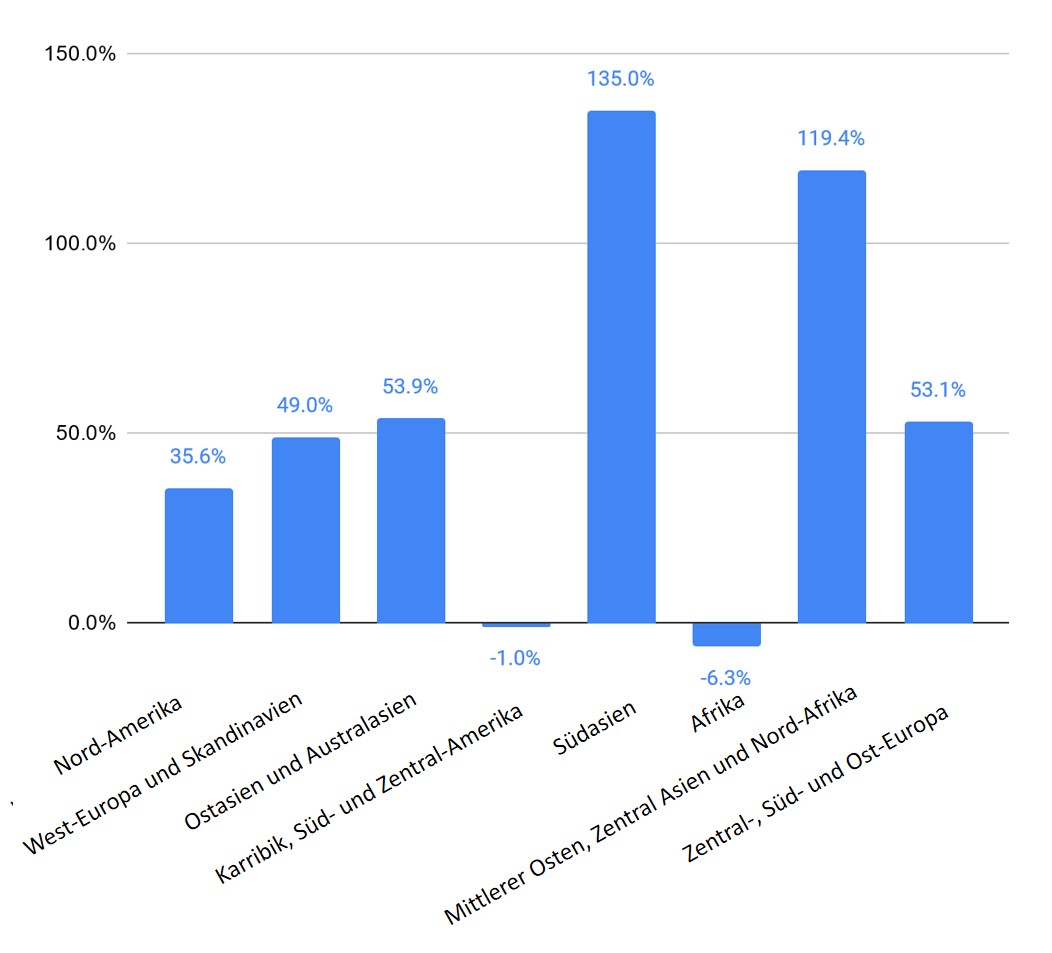
Abbildung 1: Regionale Prämien für Doktorandengehälter in den Wirtschaftswissenschaften im Vergleich zu Masterabschlüssen
Es ist klar, dass in den meisten Regionen der Erwerb eines Doktortitels in Wirtschaftswissenschaften mit einem erheblichen Aufschlag verbunden ist. Einige Ergebnisse können jedoch überraschen.
Erstens scheint die Prämie für den Erwerb eines Doktortitels in Wirtschaftswissenschaften vor allem in Nordamerika geringer zu sein als erwartet. Wenn ein promovierter Wirtschaftswissenschaftler nur 36% mehr Lohn erhält, könnte es in dieser Hochlohnregion die bessere Wahl sein, auf einen Doktortitel zu verzichten und weiter zu arbeiten.
In der Karibik, in Süd- und Mittelamerika und in Afrika liegt der Verdienst eines promovierten Wirtschaftswissenschaftlers unter dem eines Masterabsolventen. Dieses unerwartete Ergebnis scheint auf die Verteilung der Umfrageteilnehmer zurückzuführen zu sein. In beiden Regionen ist der Anteil der befragten Wirtschaftswissenschaftler aus der Industrie wesentlich höher als der der Akademiker, und die Zahl der Wirtschaftswissenschaftler mit Master-Abschluss übersteigt die der promovierten Wirtschaftswissenschaftler in den Bereichen Regierung, Zentral- und internationale Banken sowie Privatwirtschaft. Diese drei
Kategorien von Arbeitgebern zahlen in der Regel höhere Gehälter als andere. Dies deutet darauf hin, dass in diesen beiden Regionen der Erwerb eines Doktortitels nicht unbedingt erforderlich ist, um eine gut bezahlte Karriere in der Industrie zu machen. Außerdem scheint es für Wirtschaftswissenschaftler mit Master-Abschluss realistischer zu sein, in diesen Sektoren auch ohne Doktortitel eine gut bezahlte Stelle zu finden, als in vielen anderen Regionen, in denen ein Doktortitel als Voraussetzung gilt.
Wie die vorangegangene Diskussion gezeigt hat, berücksichtigt Abbildung 1 nicht die verschiedenen Sektoren, in denen Wirtschaftswissenschaftler arbeiten. Im Allgemeinen verdienen Wirtschaftswissenschaftler, die in der Industrie arbeiten, sehr hohe Löhne, während Wirtschaftswissenschaftler, die in der Wissenschaft arbeiten, deutlich weniger verdienen, bis sie schließlich zu einem ordentlichen Professor für Wirtschaftswissenschaften befördert werden. Dann gleichen sich die Gehälter akademischer Wirtschaftswissenschaftler denen der Industrie an. Dieser Trend wurde in mehreren Ausgaben des INOMICS-Gehaltsberichts festgestellt.
Dies gilt insbesondere für Nordamerika, die Region mit den höchsten Durchschnittsgehältern. Wirtschaftswissenschaftler, die in der Industrie arbeiten, können bereits mit einem Master-Abschluss hohe Gehälter erzielen. Dies gilt auch für Westeuropa und Skandinavien sowie Ostasien und Australasien, die zweit- und dritthöchstbezahlten Regionen, die im Bericht genannt werden.
In einigen anderen Regionen der Welt ist das Gehalt für promovierte Wirtschaftswissenschaftler wesentlich höher. Der Grund dafür liegt zum Teil auf der Hand. Da in Hochlohnregionen wie Westeuropa und Australasien aufgrund der höheren Lebenshaltungskosten von vornherein höhere Gehälter gezahlt werden, macht eine hohe Gehaltserhöhung in diesen Regionen einen geringeren Prozentsatz des Gesamtgehalts aus.
Diese Tatsache wird durch das Schaubild bestätigt: Nordamerika ist die Region mit den höchsten Gehältern und weist den geringsten positiven prozentualen Anstieg der Gehälter für Doktoranden auf. Westeuropa, das im Durchschnitt das zweithöchste Gehalt zahlt, weist einen etwas höheren prozentualen Anstieg auf. Die Leser sollten sich darüber im Klaren sein, dass ein Anstieg von 35,6% bei einem Grundgehalt von $100.833 (dem durchschnittlichen Gehalt für Wirtschaftswissenschaftler mit Master-Abschluss in Nordamerika) eine enorme Gehaltserhöhung darstellt. Zum Vergleich: Die fast 120%ige Gehaltserhöhung in der Region Naher Osten, Zentralasien und Nordafrika bedeutet einen Anstieg von einem durchschnittlichen Master-Gehalt von 17.321 Dollar auf fast 40.000 Dollar. In Prozenten ausgedrückt ist dies natürlich enorm, aber in Bargeld ausgedrückt weniger als der Unterschied in Nordamerika.
Darüber hinaus könnte der hohe prozentuale Aufschlag für promovierte Wirtschaftswissenschaftler in Regionen mit niedrigeren Gehältern darauf hindeuten, dass es in diesen Regionen (z. B. Südasien, Naher Osten) mehr Möglichkeiten für Wirtschaftswissenschaftler ohne Doktortitel gibt, eine sinnvolle Beschäftigung zu finden, so dass sich weniger Personen für ein Promotionsstudium entscheiden. Wenn dies zutrifft, genießen diejenigen, die einen Doktortitel erwerben, einen hohen Gehaltsaufschlag gegenüber ihren Kollegen, da Doktortitel in Wirtschaftswissenschaften in diesen Regionen seltener sind.
Akademische Wirtschaftswissenschaftler brauchen einen Doktortitel
Studierende der Wirtschaftswissenschaften sollten bedenken, dass für akademische Stellen mit ziemlicher Sicherheit ein Doktortitel in Wirtschaftswissenschaften erforderlich ist. Studenten der Wirtschaftswissenschaften, die an einer akademischen Laufbahn interessiert sind, sollten daher dringend ermutigt werden, einen Doktortitel in Wirtschaftswissenschaften zu erwerben, ungeachtet der Unterschiede in der Bezahlung. Die folgende Abbildung 2 zeigt den Gehaltsaufschlag für Wirtschaftswissenschaftler, die an Universitäten beschäftigt sind, nach Region:
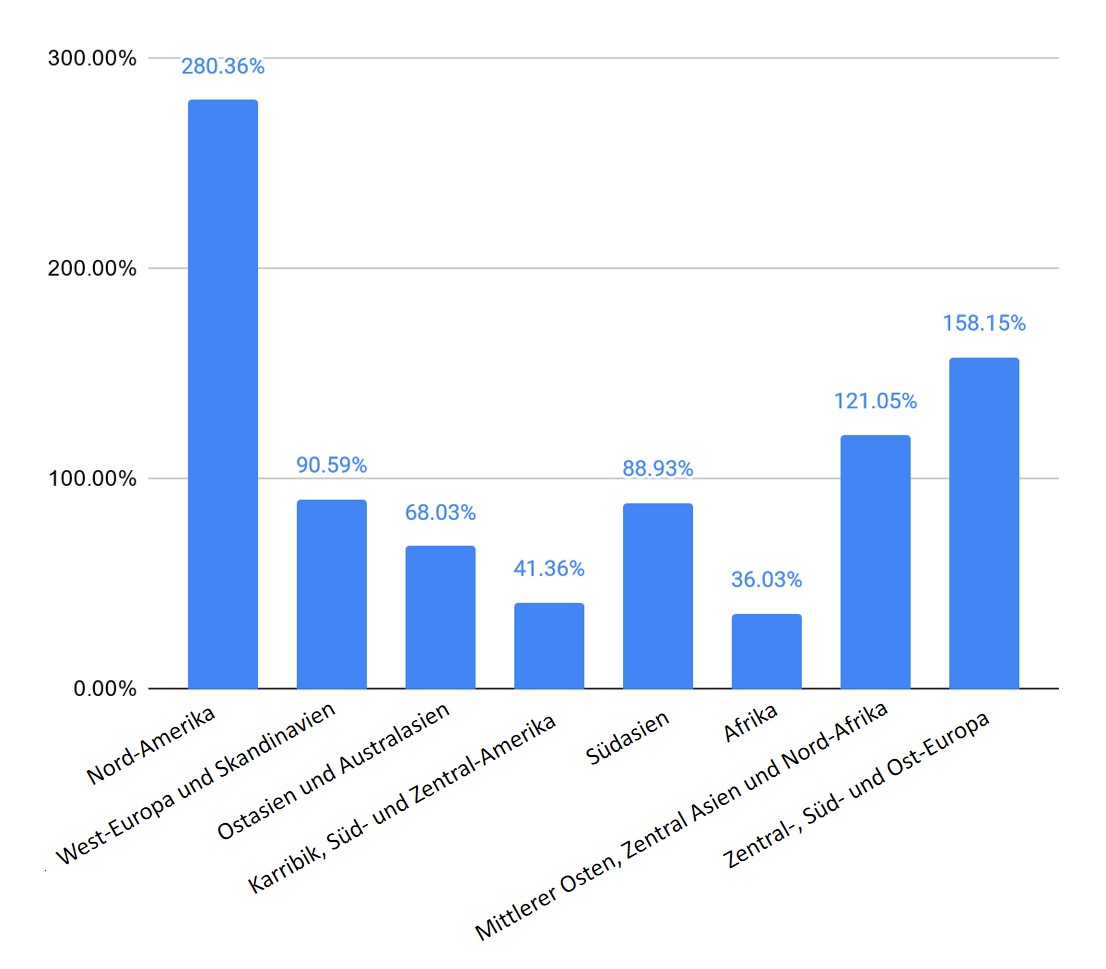
Abbildung 2: Regionale Gehaltsaufschläge für promovierte Wirtschaftswissenschaftler im Vergleich zu Masterabsolventen (nur Akademiker)
Die Gehaltsprämien für promovierte Wirtschaftswissenschaftler sprechen eine deutliche Sprache: In allen Regionen der Welt verdienen promovierte Wirtschaftswissenschaftler in der Wissenschaft deutlich mehr als ihre Kollegen ohne Doktortitel.
Die Grafik ist wahrscheinlich verzerrt, weil promovierte Wirtschaftswissenschaftler in der akademischen Welt wahrscheinlich mehr verdienen als Wirtschaftswissenschaftler ohne Doktortitel und wahrscheinlich höhere Positionen bekleiden; aber diese Verzerrung unterstreicht die Aussage. Wirtschaftswissenschaftler, die an einer ernsthaften akademischen Laufbahn interessiert sind, müssen einen Doktortitel unbedingt in Betracht ziehen oder einen besonderen Grund haben, warum sie keinen brauchen. In den meisten Ländern der Welt ist es sehr schwierig, ohne einen Doktortitel eine Stelle als Professor für Wirtschaftswissenschaften zu erhalten. Abbildung 3 unten liefert den Beweis für diesen Punkt.
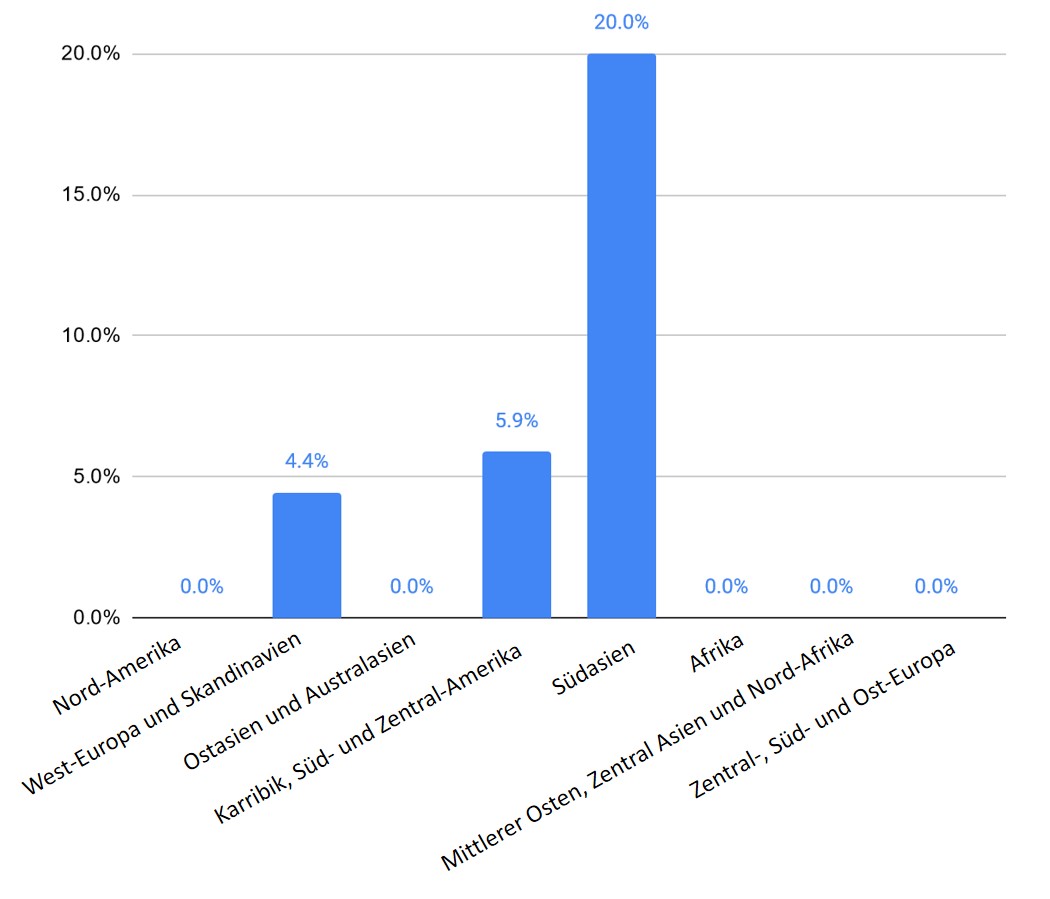
Abbildung 3: Anteil der Wirtschaftswissenschaftler mit Master-Abschluss, die als Professor tätig sind, nach Region
Abbildung 3 zeigt sehr deutlich, dass angehende Wirtschaftswissenschaftler einen Doktortitel erwarten sollten, wenn sie in Zukunft als Professor für Wirtschaftswissenschaften arbeiten wollen. In allen Regionen der Welt gibt es nur sehr wenige Professoren, die lediglich einen Master-Abschluss haben. Selbst in Südasien, das in unseren Daten bei weitem den größten Anteil an Professoren mit einem Master-Abschluss aufweist, haben nur 20% der Professoren einen Master-Abschluss, während 80% einen Doktortitel haben.
Rollen von Wirtschaftswissenschaftlern in der Industrie
Es ist klar, dass akademische Ökonomen in der Regel einen Doktortitel benötigen, was in der Industrie nicht unbedingt der Fall ist. Dennoch könnte es für die Leser interessant sein, die obigen Aufschlüsselungen in der Industrie zu wiederholen, was sehr aufschlussreich sein kann. Abbildung 4 zeigt den Gehaltsaufschlag für promovierte Wirtschaftswissenschaftler in der Industrie nach Region:
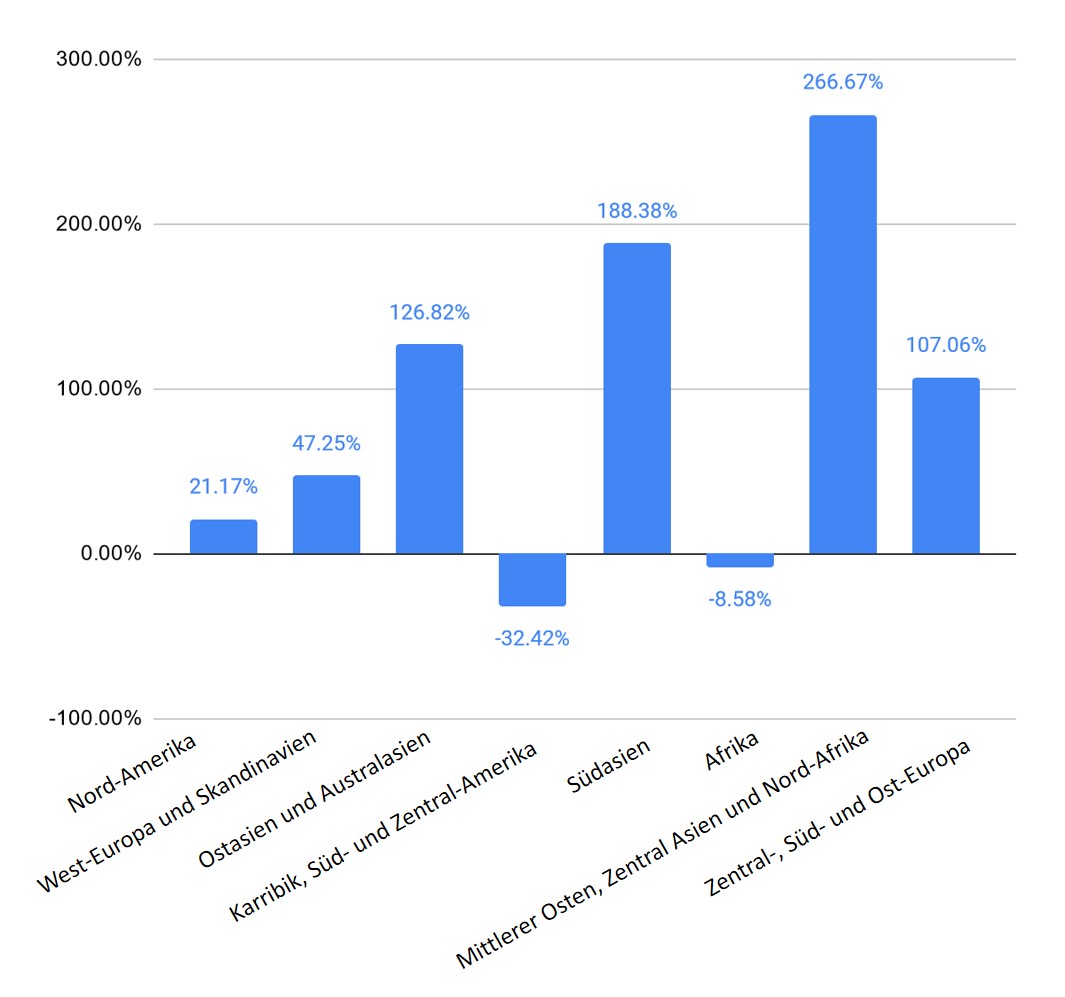
Abbildung 4: Regionale Prämien bei den Gehältern von promovierten Wirtschaftswissenschaftlern im Vergleich zu Masterabsolventen (nur Industrie)
Abbildung 4 zeigt, dass promovierte Wirtschaftswissenschaftler in den meisten Regionen deutlich mehr verdienen als Wirtschaftswissenschaftler mit Master-Abschluss in der Industrie. Das niedrigere Gehalt von promovierten Wirtschaftswissenschaftlern in der Industrie im Vergleich zu Wirtschaftswissenschaftlern mit Master-Abschluss wurde bereits oben für Afrika und die Karibik diskutiert. Zusammenfassend lässt sich sagen, dass es in diesen beiden Regionen mehr Wirtschaftswissenschaftler mit Master-Abschluss als promovierte Wirtschaftswissenschaftler in der Regierung, bei zentralen und internationalen Banken und in der Privatwirtschaft gibt. Da diese drei Kategorien von Arbeitgebern in der Regel höhere Gehälter zahlen als andere, kann dies das Diagramm leicht zugunsten der Inhaber von Masterabschlüssen verzerren. Dies deutet jedoch darauf hin, dass in diesen beiden Regionen der Erwerb eines Doktortitels nicht unbedingt erforderlich ist, um eine gut bezahlte Karriere in der Industrie zu machen.
In Nordamerika ist ein Teil des Grundes für die niedriger als erwartete Prämie wahrscheinlich die Tatsache, dass in dieser hoch bezahlten Region die hohen Grundgehälter bedeuten, dass die Gehaltserhöhungen prozentual geringer ausfallen werden. Auch dies wurde bereits erwähnt. Die durchschnittliche Berufserfahrung von Industrieökonomen in Nordamerika ist recht vergleichbar (etwa 12 Jahre für Masterabsolventen und 15 Jahre für promovierte Ökonomen), und die Verteilung der Arbeitgeber ist relativ ausgewogen.
Abbildung 4 legt nahe, dass Industrieökonomen mit einem Master-Abschluss in Nordamerika ihren Karriereweg und die Frage, ob ein Doktortitel das Richtige für sie ist, überdenken sollten, bevor sie wieder zur Schule gehen. Ein Doktortitel eröffnet einige Beschäftigungsmöglichkeiten in der Privatwirtschaft, die Inhabern eines Master-Abschlusses nicht offen stehen, und erhöht das Gehalt, aber ob dies notwendig oder erwünscht ist, hängt wahrscheinlich von der jeweiligen Person ab.
Denken Sie daran, dass bestimmte nicht-akademische Arbeitgeber - insbesondere Regierungen, Zentralbanken wie die Federal Reserve, Institutionen, die Wirtschaftswissenschaftler suchen, Nichtregierungsorganisationen wie die Weltbank und sogar zunehmend Beratungsunternehmen - für einige höhere Positionen wahrscheinlich einen Doktortitel in Wirtschaftswissenschaften verlangen. Überprüfen Sie unbedingt die Stellenangebote für wirtschaftswissenschaftliche Stellen , an denen Sie interessiert sind, um zu sehen, ob ein Doktortitel Ihnen helfen könnte, diese Stellen zu erreichen.
Vergleich der vergangenen Jahre: Verdienst von Doktoranden steigt wieder an
Anhand der INOMICS-Erhebungsdaten der vergangenen Jahre können wir untersuchen, wie sich der Nutzen einer Promotion in den Wirtschaftswissenschaften im Laufe der Zeit verändert hat. Es hat den Anschein, dass sich der Verdienstaufschlag, den promovierte Wirtschaftswissenschaftler genießen, nach einem leichten Einbruch während der Pandemiejahre wieder erholt. Siehe Abbildung 5 unten:
Abbildung 5: Wie viel mehr verdienen promovierte Ökonomen im Vergleich zu Master-Ökonomen nach Jahr, INOMICS-Daten
Abbildung 5 zeigt, dass die Verdienste von promovierten Wirtschaftswissenschaftlern im Vergleich zu den Verdiensten von Wirtschaftswissenschaftlern ohne Doktortitel erneut steigen. Es ist erwähnenswert, dass die Gehälter für Wirtschaftswissenschaftler mit beiden Abschlüssen in diesem Jahr gestiegen sind. Laut dem jüngsten INOMICS-Gehaltsbericht sind die Gehälter von Wirtschaftswissenschaftlern mit einem Master als höchstem Abschluss seit 2022 im Durchschnitt um 3,2% gestiegen, während die Gehälter von Wirtschaftswissenschaftlern mit einem Doktortitel um 35,9% gestiegen sind. Dadurch hat sich der Verdienstaufschlag zwischen den beiden Kategorien von 80% im Jahr 2022 auf 91% im Jahr 2023 vergrößert.
Die Gehaltseinbußen, die Wirtschaftswissenschaftler im Jahr 2022 hinnehmen mussten, könnten teilweise auf die COVID-19-Pandemie zurückzuführen sein. Und die Promotionsvergütung ist nicht der einzige Faktor, der sich seit COVID zu verbessern scheint. Die Erholung des Arbeitsmarktes für Wirtschaftswissenschaftler nach der Pandemie wurde bereits von INOMICS erörtert und zeigt, dass sich das Einkommen von Wirtschaftswissenschaftlern mit Master- und Bachelor-Abschluss nach den ersten Wellen der Pandemie deutlich erholt hat.
Ist ein Doktortitel in Wirtschaftswissenschaften also das Richtige für Sie? Den Daten zufolge ist dies in den meisten Fällen der Fall. Allerdings müssen Sie selbst ein Kompromiss finden, welches Ihnen Vorteile bringt. Möglicherweise brauchen Sie keinen Doktortitel, um eine erfüllende Karriere in den Wirtschaftswissenschaften zu machen, vor allem, wenn Sie in der Industrie und insbesondere in bestimmten Ländern und Regionen in einer nichtstaatlichen und nicht zentralbankgestützten Funktion arbeiten wollen.
Also Interesting
- INOMICS Recommendations
Top Summer Schools in Economics 2024
Whether you want to learn about a new topic, to brush up on your skills, or to meet more people in your economics field, summer schools are an ideal opportunity for you. Many reputable universities run intensive but stimulating summer courses that give students the chance to increase their academic standing.

- All You Need to Know
What makes a successful economist?
“The master-economist must possess a rare combination of gifts. He must reach a high standard in several different directions and must combine talents not often found together. He must be mathematician, historian, statesman, philosopher…He must study the present in the light of the past for the purposes of the future. No part of man's nature or his institutions must lie entirely outside his regard. He must be purposeful and disinterested in a simultaneous mood; as aloof and incorruptible as an artist, yet sometimes as near the earth as a politician.”

Top Master's Programs in Economics
Choosing your master's program is a big decision – with so many courses available, how can you find the right one for you? We're here to help by sharing a selection of great master's programs that you can find on INOMICS.

- economist pay
- economics PhD
- economics jobs
- economics degree
- economist jobs
- INOMICS Salary Report
- Sean McClung
Related Items

MSc/PhD in Quantitative Economics - University of Alicante

PhD in Economics - Barcelona

MRes and PhD research programme in Economics
Featured announcements, call for expression of interest for positions at the institute of…, prüfer*innen für die bankenaufsicht, 8 fully-funded phd positions in economics, analytics and decision…, 2nd rsep international multidisciplinary conference, 35th rsep international conference on economics, finance and business, bevorstehende deadlines.
- Apr 11, 2024 Full Professor (W2) in Applied Econometrics
- Apr 14, 2024 Professor in Empirical Economics and Data Science
- Apr 15, 2024 Career Integration Fellowships for western Economics PhDs teaching in CEE/fSU
- Apr 15, 2024 Doctoral Positions at the Graduate School of the Social and Behavioural Sciences (GSBS), University of Konstanz
- Apr 15, 2024 Postdoc position with a focus on Labor Economics
INOMICS AI Tools
The INOMICS AI can generate an article summary or practice questions related to the content of this article. Try it now!
An error occured
Please try again later.
3 Practical questions, generated by our AI model
For more questions on economics study topics, with practice quizzes and detailed answer explanations, check out the INOMICS Study Guides.
Login to your account
E-Mail-Adresse
Forgot your password? Click here.
- Share full article
Advertisement
Supported by
Some Colleges Will Soon Charge $100,000 a Year. How Did This Happen?
Some Vanderbilt students will have $100,000 in total expenses for the 2024-25 school year. The school doesn’t really want to talk about it.

By Ron Lieber
Reporting from Vanderbilt University in Nashville
It was only a matter of time before a college would have the nerve to quote its cost of attendance at nearly $100,000 a year. This spring, we’re catching our first glimpse of it.
Listen to this article with reporter commentary
Open this article in the New York Times Audio app on iOS.
One letter to a newly admitted Vanderbilt University engineering student showed an all-in price — room, board, personal expenses, a high-octane laptop — of $98,426. A student making three trips home to Los Angeles or London from the Nashville campus during the year could hit six figures.
This eye-popping sum is an anomaly. Only a tiny fraction of college-going students will pay anything close to this anytime soon, and about 35 percent of Vanderbilt students — those who get neither need-based nor merit aid — pay the full list price.
But a few dozen other colleges and universities that reject the vast majority of applicants will probably arrive at this threshold within a few years. Their willingness to cross it raises two questions for anyone shopping for college: How did this happen, and can it possibly be worth it?
Who Pays What
According to the College Board, the average 2023-24 list price for tuition, fees, housing and food was $56,190 at private, nonprofit four-year schools. At four-year public colleges, in-state students saw an average $24,030 sticker price.
That’s not what many people pay, though, not even close. As of the 2019-20 school year, according to federal data that the College Board used in a 2023 report , 39 percent of in-state students attending two-year colleges full time received enough grant aid to cover all of their tuition and fees (though not their living expenses, which can make getting through school enormously difficult). At four-year public schools, 31 percent paid nothing for tuition and fees while 18 percent of students at private colleges and universities qualified for the same deal.
Those private colleges continue to provide hefty discounts for people of all sorts of incomes. A National Association of College and University Business Officers study showed private nonprofit colleges and universities lowering their tuition prices by 56 percent from the rack rate during the 2022-23 school year.
Vanderbilt provides discounts, too, and its financial aid is extraordinarily generous. This year, it announced that families with income of $150,000 or less would pay no tuition in most instances .
Still, over 2,000 students there who get no need-based or merit aid will soon pay $100,000 or more. Why does Vanderbilt need all of that money?
Where the Money Goes
At a few small liberal arts colleges with enormous endowments, even $100,000 would not cover the average cost of educating a student, according to the schools. Williams College says it spends roughly $50,000 more per student than its list price, for instance.
In other words, everyone is getting a subsidy. Perhaps its list price should be over $100,000, too, so that its endowment is not offering unneeded help to wealthy families. Or, perhaps, a price that high would scare away low-income applicants who do not realize that they might get a free ride there.
According to Vanderbilt, its spending per undergraduate is $119,000. “The gap between the price and cost of attendance is funded by our endowment and the generous philanthropy of donors and alumni,” Brett Sweet, vice chancellor for finance, said in an emailed statement.
No one at the school would meet with me to break this figure down or get on the phone to talk about it. But Vanderbilt’s financial statements offer clues to how it spends money. In the 2023 fiscal year, 52 percent of its operating expenses went to faculty, staff and student salaries and wages, plus fringe benefits.
Robert B. Archibald and David H. Feldman, two academics who wrote “ Why Does College Cost So Much? ,” explained in their book why labor costs were so tricky at these institutions.
“The critical factors are that higher education is a personal service, that it has not experienced much labor-saving productivity growth, and that the wages of the highly educated workers so important at colleges and universities have soared,” they said. “These are economywide factors. They have little to do with any pathology in higher education.”
Critics of the industry still believe that a kind of administrative bloat has set in, driving up tuition with outsize salaries. But what is bloat, really?
Administrators oversee compliance, like the laws that have made it possible for disabled people to get to and through college and keep schools from discriminating against women. If we don’t like regulation, we can vote for different legislators.
Similarly, families in a free market can make alternative choices if they want fewer mental health practitioners and their bosses, computer network administrators, academic advisers or career counselors. And yet the first (prescreened) question that Vanderbilt’s chancellor, Daniel Diermeier, answered on family weekend this past fall was about whether Vanderbilt should invest even more in career advising in the wake of the school’s five-spot decline in the annual U.S. News rankings .
Is It Worth It?
If many families are not exactly lining up for a cut-rate residential undergraduate education, they’re still asking plenty of good questions about value. So is a $400,000 college education ever worth it?
It depends, and you knew that answer was coming, right?
Most college shoppers wonder about income outcomes, and it’s possible to search by undergraduate major on the federal government’s College Scorecard website . This program-level data exists for alumni who are four years out from graduation, though only for those who received any federal financial aid.
Vanderbilt’s biomedical/medical engineering majors have median earnings of $94,340 four years out. English language and literature majors are earning $53,767.
Those are fine results, but are they exclusive to Vanderbilt? “You could get an engineering degree at a state flagship university that’s just as valuable as something you’d get at Vanderbilt,” said Julian Treves , a financial adviser and college specialist whose newsletter tipped me off to the goings-on there.
I spent a few days trying to get Vanderbilt’s vice provost for university enrollment affairs, Douglas L. Christiansen , to talk to me and answer these questions squarely and more expansively, but I did not succeed. A university spokeswoman sent me some generalities in his name. “We are committed to excellence at all levels, from the quality of our faculty, programming, facilities and research labs to the services we provide to support the academic, emotional and social well-being of our students,” went the statement.
In anticipation of the absence of a substantive reply, I attended a group information session for 125 or so prospective students and asked there, too. The senior admissions officer who took the question refused to answer. I’d never seen that before, and I’ve been to these sessions at dozens of schools over the years.
But really, why should an actor in a competitive marketplace answer that question if the person doesn’t absolutely have to? Without publicly available, industrywide quantitative data on quality — happiness scores, customer satisfaction, measures of learning, return on friendship, the strength of career networks — the list price alone serves as a signal of excellence, to some shoppers at least.
And thousands of applicants respond to the signal each year by volunteering to pay the list price, even as the school rejects the vast majority of applicants. Or maybe they volunteer precisely because Vanderbilt and schools like it reject the vast majority of applicants.
So a $100,000 list price is not our highest-priority outrage. The spectacle of wealthy people freely purchasing luxury services is nothing new, even if it is a totally worthy object of scrutiny (and an understudied phenomenon by academics themselves, ahem).
What is a problem, then? Brent Joseph Evans , an associate professor of public policy and higher education at Vanderbilt’s college of education and human development, started his career as an admissions officer at the University of Virginia. There, he sold the institution to boarding school students in New England and teenagers in the Appalachian foothills.
The former group might pay $100,000 per year, though many of them won’t get into the Vanderbilts of the world in the first place. They will surely find their way somewhere.
But that latter group? Professor Evans is worried about their access to any school at all.
“We should care about whether they get into a state university system at a low cost and find a well-paying career that can keep them in the middle class,” he said. “I do think that sometimes any tension over what elite colleges are doing moves us away from what we should be caring about as a society.”
Read by Ron Lieber
Audio produced by Parin Behrooz .
An earlier version of this article misstated the surname of Vanderbilt’s vice provost for university enrollment affairs. He is Douglas L. Christiansen, not Christensen.
How we handle corrections
Ron Lieber has been the Your Money columnist since 2008 and has written five books, most recently “The Price You Pay for College.” More about Ron Lieber
The Complete Guide to Getting Into an Economics Ph.D. Program
Math challenged? Never taken an econ class? Don't worry about it. There's hope for you yet.

Back in May, Noah wrote about the amazingly good deal that is the PhD in economics. Why? Because:
- You get a job.
- You get autonomy.
- You get intellectual fulfillment.
- The risk is low.
- Unlike an MBA, law, or medical degree, you don't have to worry about paying the sticker price for an econ PhD: After the first year, most schools will give you teaching assistant positions that will pay for the next several years of graduate study, and some schools will take care of your tuition and expenses even in the first year.
Of course, such a good deal won't last long now that the story is out, so you need to act fast! Since he wrote his post , Noah has received a large number of emails asking the obvious follow-up question: "How do I get into an econ PhD program?" And Miles has been asked the same thing many times by undergraduates and other students at the University of Michigan. So here, we present together our guide for how to break into the academic Elysium called Econ Ph.D. Land:
(Note: This guide is mainly directed toward native English speakers, or those from countries whose graduate students are typically fluent in English, such as India and most European countries. Almost all highly ranked graduate programs teach economics in English, and we find that students learn the subtle non-mathematical skills in economics better if English is second nature. If your nationality will make admissions committees wonder about your English skills, you can either get your bachelor's degree at a -- possibly foreign -- college or university where almost all classes are taught in English, or you will have to compensate by being better on other dimensions. On the bright side, if you are a native English speaker, or from a country whose graduate students are typically fluent in English, you are already ahead in your quest to get into an economics Ph.D. program.)
Here is the not-very-surprising list of things that will help you get into a good econ Ph.D. program:
- good grades, especially in whatever math and economics classes you take,
- a good score on the math GRE,
- some math classes and a statistics class on your transcript,
- research experience, and definitely at least one letter of recommendation from a researcher,
- a demonstrable interest in the field of economics.
Chances are, if you're asking for advice, you probably feel unprepared in one of two ways. Either you don't have a sterling math background, or you have quantitative skills but are new to the field of econ. Fortunately, we have advice for both types of applicant.
If You're Weak in Math... Fortunately, if you're weak in math, we have good news: Math is something you can learn . That may sound like a crazy claim to most Americans, who are raised to believe that math ability is in the genes. It may even sound like arrogance coming from two people who have never had to struggle with math. But we've both taught people math for many years, and we really believe that it's true. Genes help a bit, but math is like a foreign language or a sport: effort will result in skill.
Here are the math classes you absolutely should take to get into a good econ program:
- Linear algebra
- Multivariable calculus
Here are the classes you should take, but can probably get away with studying on your own:
- Ordinary differential equations
- Real analysis
Linear algebra (matrices, vectors, and all that) is something that you'll use all the time in econ, especially when doing work on a computer. Multivariable calculus also will be used a lot. And stats of course is absolutely key to almost everything economists do. Differential equations are something you will use once in a while. And real analysis -- by far the hardest subject of the five -- is something that you will probably never use in real econ research, but which the economics field has decided to use as a sort of general intelligence signaling device.
If you took some math classes but didn't do very well, don't worry. Retake the classes. If you are worried about how that will look on your transcript, take the class the first time "off the books" at a different college (many community colleges have calculus classes) or online. Or if you have already gotten a bad grade, take it a second time off the books and then a third time for your transcript. If you work hard, every time you take the class you'll do better. You will learn the math and be able to prove it by the grade you get. Not only will this help you get into an econ Ph.D. program, once you get in, you'll breeze through parts of grad school that would otherwise be agony.
Here's another useful tip: Get a book and study math on your own before taking the corresponding class for a grade. Reading math on your own is something you're going to have to get used to doing in grad school anyway (especially during your dissertation!), so it's good to get used to it now. Beyond course-related books, you can either pick up a subject-specific book (Miles learned much of his math from studying books in the Schaum's outline series ), or get a "math for economists" book; regarding the latter, Miles recommends Mathematics for Economists by Simon and Blume, while Noah swears by Mathematical Methods and Models for Economists by de la Fuente. When you study on your own, the most important thing is to work through a bunch of problems . That will give you practice for test-taking, and will be more interesting than just reading through derivations.
This will take some time, of course. That's OK. That's what summer is for (right?). If you're late in your college career, you can always take a fifth year, do a gap year, etc.
When you get to grad school, you will have to take an intensive math course called "math camp" that will take up a good part of your summer. For how to get through math camp itself, see this guide by Jérémie Cohen-Setton .
One more piece of advice for the math-challenged: Be a research assistant on something non-mathy. There are lots of economists doing relatively simple empirical work that requires only some basic statistics knowledge and the ability to use software like Stata. There are more and more experimental economists around, who are always looking for research assistants. Go find a prof and get involved! (If you are still in high school or otherwise haven't yet chosen a college, you might want to choose one where some of the professors do experiments and so need research assistants -- something that is easy to figure out by studying professors' websites carefully, or by asking about it when you visit the college.)
If You're New to Econ... If you're a disillusioned physicist, a bored biostatistician, or a neuroscientist looking to escape that evil Principal Investigator, don't worry: An econ background is not necessary . A lot of the best economists started out in other fields, while a lot of undergrad econ majors are headed for MBAs or jobs in banks. Econ Ph.D. programs know this. They will probably not mind if you have never taken an econ class.
That said, you may still want to take an econ class, just to verify that you actually like the subject, to start thinking about econ, and to prepare yourself for the concepts you'll encounter. If you feel like doing this, you can probably skip Econ 101 and 102, and head straight for an Intermediate Micro or Intermediate Macro class.
Another good thing is to read through an econ textbook. Although economics at the Ph.D. level is mostly about the math and statistics and computer modeling (hopefully getting back to the real world somewhere along the way when you do your own research), you may also want to get the flavor of the less mathy parts of economics from one of the well-written lower-level textbooks (either one by Paul Krugman and Robin Wells , Greg Mankiw , or Tyler Cowen and Alex Tabarrok ) and maybe one at a bit higher level as well, such as David Weil's excellent book on economic growth ) or Varian's Intermediate Microeconomics .
Remember to take a statistics class, if you haven't already. Some technical fields don't require statistics, so you may have missed this one. But to econ Ph.D. programs, this will be a gaping hole in your resume. Go take stats!
One more thing you can do is research with an economist. Fortunately, economists are generally extremely welcoming to undergrad research assistants from outside econ, who often bring extra skills. You'll get great experience working with data if you don't have it already. It'll help you come up with some research ideas to put in your application essays. And of course, you'll get another all-important letter of recommendation.
And now for...
General Tips for Everyone Here is the most important tip for everyone: Don't just apply to "top" schools . For some degrees -- an MBA for example -- people question whether it's worthwhile to go to a non-top school. But for econ departments, there's no question. Both Miles and Noah have marveled at the number of smart people working at non-top schools. That includes some well-known bloggers, by the way--Tyler Cowen teaches at George Mason University (ranked 64th ), Mark Thoma teaches at the University of Oregon (ranked 56th ), and Scott Sumner teaches at Bentley, for example. Additionally, a flood of new international students is expanding the supply of quality students. That means that the number of high-quality schools is increasing; tomorrow's top 20 will be like today's top 10, and tomorrow's top 100 will be like today's top 50.
Apply to schools outside of the top 20 -- any school in the top 100 is worth considering, especially if it is strong in areas you are interested in. If your classmates aren't as elite as you would like, that just means that you will get more attention from the professors, who almost all came out of top programs themselves. When Noah said in his earlier post that econ Ph.D. students are virtually guaranteed to get jobs in an econ-related field, that applied to schools far down in the ranking. Everyone participates in the legendary centrally managed econ job market . Very few people ever fall through the cracks.
Next -- and this should go without saying -- don't be afraid to retake the GRE. If you want to get into a top 10 school, you probably need a perfect or near-perfect score on the math portion of the GRE. For schools lower down the rankings, a good GRE math score is still important. Fortunately, the GRE math section is relatively simple to study for -- there are only a finite number of topics covered, and with a little work you can "overlearn" all of them, so you can do them even under time pressure and when you are nervous. In any case, you can keep retaking the test until you get a good score (especially if the early tries are practice tests from the GRE prep books and prep software), and then you're OK!
Here's one thing that may surprise you: Getting an econ master's degree alone won't help. Although master's degrees in economics are common among international students who apply to econ PhD programs, American applicants do just fine without a master's degree on their record. If you want that extra diploma, realize that once you are in a PhD program, you will get a master's degree automatically after two years. And if you end up dropping out of the PhD program, that master's degree will be worth more than a stand-alone master's would.
For getting into grad school, much more valuable than a master's is a stint as a research assistant in the Federal Reserve System or at a think tank -- though these days, such positions can often be as hard to get into as a Ph.D. program!
Finally -- and if you're reading this, chances are you're already doing this -- read some econ blogs. (See Miles's speculations about the future of the econ blogosphere here .) Econ blogs are no substitute for econ classes, but they're a great complement. Blogs are good for picking up the lingo of academic economists, and learning to think like an economist. Don't be afraid to write a blog either, even if no one ever reads it (you don't have to be writing at the same level as Evan Soltas or Yichuan Wang ); you can still put it on your CV, or just practice writing down your thoughts. And when you write your dissertation, and do research later on in your career, you are going to have to think for yourself outside the context of a class. One way to practice thinking critically is by critiquing others' blog posts, at least in your head.
Anyway, if you want to have intellectual stimulation and good work-life balance, and a near-guarantee of a well-paying job in your field of interest, an econ PhD could be just the thing for you. Don't be scared of the math and the jargon. We'd love to have you.
'Nothing that compares': Economic spinoffs from eclipse worth the hype for N.B. communities
Early indications suggest the hype for Monday’s total solar eclipse was worth it in New Brunswick.
“There’s absolutely nothing that compares to what I’ve seen this past weekend here,” says Paul McGraw, an organizer with Miramichi’s economic and tourism department who’s helped run local events for close to 30 years. “It was just phenomenal to see the breadth of the people we had, let alone the numbers.”
Eclipse chasers who ran out the clock weighing weather forecasts and totality times were arriving in Miramichi on Monday afternoon, just ahead of the spectacle.
“We had private charter jets that were landing at the airport and sitting on the tarmac,” says McGraw. “The farthest we know came from the San Francisco-Oakland area in California.”
McGraw says a conservative estimate of about 12,000 people watched the eclipse at Miramichi Airport, where a running tally was kept of where drivers were coming from.
“You see people from all over the northeastern United States,” says McGraw. “On the viewing day we had one vehicle that registered from western Australia.”
- The information you need to know, sent directly to you: Download the CTV News App
Betty Lanigan was in Miramichi for the eclipse , visiting from Ireland on Monday.
“We were going to go to San Diego and maybe just follow the path of totality and see which would be the best,” Lanigan told CTV on Monday. “And when we followed the path and realized it was going to come up through New Brunswick it was a no brainer, we had to come here.”
Andrew Harvey, mayor of the District of Carleton North, says Monday’s eclipse was the biggest event to ever happen in the rural region.
“We’re very fortunate we were able to showcase the area, and work with other communities too,” says Harvey . “We worked with Woodstock, Hartland, Southern Victoria and Tobique Valley on this initiative.”
The influx of visitors was easy to spot in several communities.
“I saw license plates on the street here from Nova Scotia, from Maine, from New Hampshire, from Maryland, from Pennsylvania, they were from all over,” says downtown Woodstock business owner Woody Milbury.
Hotels in Miramichi, Woodstock, Florenceville-Bristol, and Fredericton reported no-vacancy on Sunday and Monday.
Several New Brunswick communities held days of special eclipse related events .
Mary Ellen Hudson of Tourism Fredericton says events under the city’s ‘EclipseFest’ banner were at capacity, calling it “a great early kick off to our tourism season.”
In Miramichi, McGraw says the immediate economic effect of accommodations and meals could help cover losses from this past winter’s rough tourism season , while setting the stage for summer “to take off with a bang.”
With files from CTV Atlantic’s Crystal Garrett and Alana Pickrell
For more New Brunswick news visit our dedicated provincial page.
Atlantic top stories.

Dartmouth, N.S., walk-in medical clinic to close

April rain, showers return to the Maritimes

Half of Atlantic Canadians feeling 'social squeeze' on personal finances: MNP

Presence of tents in non-designated Halifax areas a concern for some

Family of man who died in Fredericton ER waiting room worries it will happen again

Queens of the Stone Age bring 'The End is Nero Tour' to the Maritimes

Clean up underway after rough winter at Saint John’s Irving Nature Park

Cape Breton asks N.S. government for help tearing down hundreds of abandoned buildings
Ctvnews.ca top stories.

'Democracy requires constant vigilance' Trudeau testifies at inquiry into foreign election interference in Canada
Prime Minister Justin Trudeau testified Wednesday before the national public inquiry into foreign interference in Canada's electoral processes, following a day of testimony from top cabinet ministers about allegations of meddling in the 2019 and 2021 federal elections. Recap all the prime minister had to say.
Unidentified metal object crashes through roof of Kitchener, Ont., home
A family in Kitchener, Ont., says a hunk of metal fell out of the sky Monday morning and smashed through their home.
B.C. man acquitted of manslaughter after fatal fight at house party
A Vancouver Island man has been acquitted of manslaughter after he violently defended himself in an altercation with a 53-year-old attacker following an alcohol-fuelled house party.
NDP backs Tory motion, saying carbon price not 'be-all, end-all' of climate policy
The federal New Democrats backed Conservative demands Wednesday that Prime Minister Justin Trudeau take part in a televised 'emergency meeting' on carbon pricing with Canada's premiers.
Northern Ont. politician rejects flying Pride flag, says it represents a 'splinter group'
A recent decision by the northern Ontario community of East Ferris, near North Bay, not to fly the Pride flag isn’t sitting well with some.
A fish harvester's protest threatens Newfoundland and Labrador's crab season — again
Longliners across Newfoundland and Labrador are tied up once again, as a new protest by the province's fish harvesters threatens to derail the crab fishery for a second straight year.
Lithium-ion battery fires on the rise across Canada, fire chiefs warn
Fires caused by lithium-ion batteries are on the rise across Canada, according to the organization that represents the country's fire chiefs, prompting warnings from fire services, injury law firms and even Health Canada.
Quebec teacher fired after taking leave to be on 'Survivor' reality TV series
A school teacher who took part in the Quebec version of the Survivor reality TV show took time off work to be a contestant is now out of a job.
'I'm not paying it': Family furious over $400/day hospital fine for not moving to LTC
A few weeks ago, Michele Campeau faced what seemed like an impossible decision: move her mom from a hospital bed to a long-term care home the family hated or pay $400 a day to remain at the health-care facility.
Shopping Trends
The Shopping Trends team is independent of the journalists at CTV News. We may earn a commission when you use our links to shop. Read about us.
Editor's Picks
14 of the best interactive dog toys to stimulate your dog's mind, if you're ready to dip your toes into spring cleaning, you'll want to order at least one of these amazon products, 19 amazon canada products that'll solve a bunch of your little problems, 17 practical things for your backyard that you'll want to order immediately, 17 travel products that reviewers swear by, 10 instant-read meat thermometers that'll help you cook like a pro chef, 20 gifts that are so great, you'll want to keep them for yourself, 15 awesome presents to give if you're tired of gift cards, 19 of the best mother's day gifts under $50, 16 night creams that'll work magic on your skin while you sleep, if you're on the hunt for a retinol serum, here are 12 that reviewers are loving right now, rosemary oil and 11 other products that reviewers swear by for hair growth.

$2 million worth of drugs seized by police west of Toronto
More than $2 million worth of drugs have been seized, and nine people have been charged following an investigation into an alleged criminal network importing illegal narcotics into Canada and distributing them in the Greater Toronto Area and other provinces.
Case of measles confirmed in Ontario with possible health clinic exposure
Another case of measles has been confirmed in Ontario and officials are warning that others may have been exposed at health clinics.
NBA Commissioner says Toronto Raptor Jontay Porter could be banned from league following gambling probe result
Toronto's Jontay Porter could face expulsion from the league if the gambling-related accusations against him are found to be true, NBA Commissioner Adam Silver said Wednesday.

Calgary man charged in McKenzie Towne murder was victim's tenant: police
A Calgary man has been charged with murder following a homicide in McKenzie Towne earlier this week.
'Not very happy about it': Calgary residents voice concerns about blanket rezoning proposal
Calgary residents gathered at an open house on Tuesday to have their voices heard on proposed blanket rezoning throughout the city.
Bermuda Shorts Day party closes street, draws police to frustration of neighbours
A series of connected parties prompted police to close a block of a residential street Tuesday as students celebrated the last day of classes.

Alberta tables gatekeeper bill on federal funding, cites housing money as last straw
Alberta Premier Danielle Smith has introduced a gatekeeping law that would allow the province to veto any future deal struck between municipalities and the federal government.
'This was a fairly significant fatal injury': Medical examiner testifies at teen's manslaughter trial
A medical examiner was one of the final witnesses called by the Crown during a teen's manslaughter trial in Edmonton.
City council approves spending $33M on two supportive housing projects
The City of Edmonton has chosen to start a pair of projects that failed to secure federal government housing funding.

Man charged with second-degree murder after woman found dead in Montreal suburb
A 38-year-old man has been charged with second-degree murder in the death of a 27-year-old woman southwest of Montreal.
New security plan for Montreal metro amid rise in mental health and addictions issues
Montreal's transit corporation is concentrating security personnel in certain metro stations amid what officials say has been a rise in the number of people with mental health or addiction issues in the network.

Ontario truck driver facing 14 charges, including cocaine possession on Hwy. 417
An Ontario truck driver is facing 14 charges on various infractions, including possession of cocaine and driving on a suspended licence.
Ottawa paramedics launch new 9-1-1 ambulance dispatch system
Ottawa's ambulance dispatchers are using a new system for dispatching emergency medical responses on Wednesday, designed to more accurately triage calls and improve response times for life-threatening calls.
Seven units damaged by fire in Ottawa apartment building
Ottawa fire says 9-1-1 received multiple calls just before 8 p.m. Tuesday, reporting heavy smoke and flames coming from a window of the sixth floor of an apartment building on Halifax Drive.

Jury hears siblings tried to protect each other in child abuse case
There was more disturbing evidence Wednesday at the trial of two parents charged with sexually abusing their children.
Potentially heavy rainfall amounts prompts special weather statement across region
A special weather statement is in effect for London-Middlesex, Elgin County, Huron-Perth, Oxford-Brant, and Sarnia-Lambton.
Woodstock, Ont. inches closer to new elementary school
On Wednesday, the Thames Valley District School Board announced the tender for construction of the nearly $32 million facility in north Woodstock.

Unexpected guest makes brief appearance live on air with KC Colby
Viewers were treated to an unexpected guest during CTV Weather Specialist KC Colby's weather segment on Wednesday.
4 individuals charged in extensive drug trafficking probe
Four people face charges in connection with a drug trafficking investigation.
Students sent home early after fire breaks out in Barrie high school
Students at St. Joseph's Catholic High School in Barrie were sent home and given the day off on Wednesday after the fire alarm sounded.
Northern Ontario

Heavy rainfall warning in effect across northeastern Ont.
Environment Canada has issued a heavy rainfall warning for northeastern Ontario, with rain expected to arrive Thursday.
Sudbury police looking for man wanted for intimate partner violence
A 33-year-old man is wanted by Sudbury police for criminal charges involving intimate partner violence.

Hydro One worker airlifted after serious fall near Kitchener, Ont.
The Ministry of Labour is investigating after two Hydro One workers were hurt while working on a transmission tower near Petersburg, Ont., just outside Kitchener.
How to tell if you have eye damage after staring at the eclipse
Monday’s solar eclipse had all eyes on the sky – but if you weren’t wearing proper protection you might need to get your eyes checked.

'They're deserving children': Shortage of funds could threaten decades old camp
There are a lot of issues on the plate of Dan Inverarity, camp manager for Kiwanis Sunshine Point Camp in Colchester. 'This is our 78th year and I want there to be a 79th and 80th year. I don't want to close the camp,' he said.
$18,000 in drugs seized from east Windsor home
Windsor police have arrested a 35-year-old man and seized over $18,000 in illicit drugs in east Windsor.
Bank of Canada holds interest rate at 5% and Windsor-Essex realtor is 'kind of glad it did'
The Bank of Canada held its policy rate at 5 per cent on Wednesday, saying it needs to see a sustained decline in inflation before rate cuts can begin.

Bike Winnipeg calling for Russ Wyatt to be removed from city committee following 'offensive' comments
A local organization is calling on a Winnipeg councillor to be removed from the public works committee following comments made at a meeting on Tuesday.
Former teacher sentenced to 33 months for child luring
A former teacher faces 33 months in prison for child luring.
Winnipeg police charge chief of Lake St. Martin First Nation with sexual assault
A First Nations chief in Manitoba is facing charges in the alleged sexual assault of a child.

Fire at Cornwall Centre 'deliberately set' fire service says
A fire that caused "extensive damage" to The Bay at the Cornwall Centre was deliberately set, Regina Fire and Protective Services (RFPS) say.
'Shouldn't have to fight this hard for care': Pediatric specialists needed in Sask., NDP says
Concern grows for Saskatchewan families who need care from pediatric specialists in the province.
Saskatchewan Roughriders' new play-by-play voice revealed
Harvard Media has named the next 620 CKRM play-by-play voice of the Saskatchewan Roughriders.

'Futile': Saskatoon city council, police grapple with perceptions of crime in Fairhaven
City councillors heard crime concerns from residents Wednesday after receiving a joint report by Saskatoon police the fire department about community changes following the opening of a major emergency shelter.
Sask. man arrested after vehicle nearly collides with RCMP detachment
A 51-year-old Radisson man was arrested after police say he nearly drove his vehicle into the Warman RCMP detachment.
Thousands of Sask. Muslims gather to celebrate Eid, the blessed feast
Muslims from across Saskatchewan are celebrating Eid — the end of Ramadan.

Shots fired in Willowbrook, Langley RCMP say
Mounties are investigating shots fired in the Willowbrook neighbourhood of Langley Wednesday afternoon.
'Handgun' brandished at SkyTrain station was actually butane lighter, NWPD says
Police in New Westminster say they made two arrests Wednesday morning after an incident involving a purported "handgun" that turned out to be a butane lighter.
Vancouver Island

Man dead, suspect at large after stabbing in Victoria
One man is dead and a suspect remains at large after a stabbing near downtown Victoria on Tuesday night.
Terry Fox collection including shoes, prosthetic leg to be held at Royal BC Museum
The Royal BC Museum has been named the steward of a collection of Terry Fox's belongings, including the shoes and prosthetic leg he wore during his Marathon of Hope.

Evacuation of Kelowna, B.C., apartment near construction site extended for two weeks
More than 80 residents from a low-income apartment building in Kelowna, B.C., have learned they won't be able to return to their homes for at least another two weeks.
2 men injured after 'road rage' incident with Dodge Ram driver, Kelowna RCMP say
Mounties are investigating a reported "road rage" incident in Kelowna, B.C., that left two men injured last week.
Unstable nearby construction site forces evacuation of apartment in Kelowna, B.C.
More than 80 residents of a low-income apartment building in Kelowna, B.C., have been told they need to leave over a 'significant' risk to life and safety.
Stay Connected


Watch live : The 2024 total solar eclipse
It’s clear that Monday’s solar eclipse , in which the Moon’s passing will be carving a path of total Sun blockage from Texas to Maine, is going to be generating a lot of economic activity. Travel companies have been offering deals , and lots of businesses are trying to use the astrological phenomenon to drum up sales for all sorts of items that have nothing to do with it.
But how much is all that worth to the economy?
One outfit, the Perryman Group, estimates that the impact could be more than several billion dollars between direct tourist spending ($1.6 billion) and other knock-on consumption (as much as $6 billion).
“While the eclipse is a one-day event, many areas are hoping that the influx of visitors from across the nation and beyond will lead to lasting benefits,” the firm said. “Areas that rarely receive much in the way of widespread or national media coverage are likely to be featured, enhancing the prospects for future tourism as well as other developmental benefits.”
The Perryman Group says that its estimation methodology is based on a system of surveys, industry information, and other inputs that it uses to figure out how much various factors will lead to more or less economic activity. It sells such estimates to clients like corporations and government groups.
The report also ranked the so-called “path of totality” states by how much economic impact they should be expecting to receive due to the eclipse. Coming in first place is Texas ($1.4 billion total impact), where the eclipse will begin making its way through the U.S. In last place is New Hampshire ($2 million), where the eclipse will spending just a bit of time along the state’s northern edge before exiting the country.
📬 Sign up for the Daily Brief
Our free, fast, and fun briefing on the global economy, delivered every weekday morning.

IMAGES
VIDEO
COMMENTS
Data science uses the stuff you learned in econometrics, but it isn't really an econ job per se. Fortunately, a lot more companies are hiring economists to do actual economics. For a primer, read this 2018 paper by Susan Athey and Michael Luca (Athey is probably the second-most-famous private sector economist after Hal Varian, and is one of the profession's true geniuses, so heed her advice).
An economics PhD is one of the most attractive graduate programs: if you get through, you have a high chance of landing a good research job in academia or policy - promising areas for social impact - and you have back-up options in the corporate sector since the skills you learn are in-demand (unlike many PhD programs). You should especially consider an economics PhD if you want to go into ...
Yes, a PhD in Economics is worth it. Getting an economics PhD is a great way to gain valuable skills for the econ job market, work on your overall communication, and guarantee financial security and stability over the course of your career.
In economics PhD programs, the main risk of failure is not passing your preliminary exams. This happens to a substantial fraction of people who get admitted to econ programs (maybe 25% or fewer at ...
First, it was genuine. It wasn't a "why didn't I get into a Ph.D. program" rant, but a personal story told with thoughtful insights. In fact, my experience has been nearly identical, and I would encourage any undergraduate student considering pursuing a Ph.D. in economics to take this reader's insights to heart.
Earning a PhD in Economics means you have completed the highest level of education in the discipline, thereby creating nearly unlimited opportunities for any job in a related field. As a PhD economist, you'll have the skills to analyze real-world economic data with rigorous statistical techniques, critically assess the economic implications of ...
Here is the not-very-surprising list of things that will help you get into a good econ PhD program: good grades, especially in whatever math and economics classes you take, a good score on the ...
Do a Ph.D. in Business instead - it is half the work and when you leave you to get twice the salary. It's a no-brainer. Are a great communicator and teacher, but bored by research. Academic economics is set up for people who have a comparative advantage in research. Go somewhere where a comparative advantage in communication is an asset - such ...
Get my FREE grad school application worksheet: https://marketpower.substack.com/p/gradschool-masterclassWondering if you should get a PhD? Here's my advice....
Measuring worth in a purely financial and employment point of view, PhDs have better outcomes than masters or first-degree graduates. Across the UK, 95 per cent of PhDs 15 months after leaving ...
It's worth noting that pay for economists with both degree types has increased this year. According to the latest INOMICS Salary Report, economists with a Master's as their highest degree experienced a 3.2% increase in pay on average since 2022, while those with a PhD have experienced a 35.9% increase.
Easily ~20k a year, so ~100k is a very low estimate of the catch-up you'd "need" to do once you exit grad school with that PhD. I totally sign the "only worth if you want it for the thing itself"-statement. Doing it for being the smartass with a PhD is possible, but a high price you'd pay for something you don't really need.
With an estimated 13% employment growth rate for economists in the next decade, an economics degree is worth it to many. Entry-level jobs are available for graduates with a bachelor's degree in economics. But, to thrive in the field, many people do also go on to pursue a Master's degree or PhD in economics. Contents show.
If a graduate degree in economics is on your mind, you may wonder why someone would pursue a doctorate degree in the field. After all, many master's degrees in economics are designed to prepare students like you for myriad economics careers. But while a master's degree will help you stand out against competitors in the job. market, a PhD can open even more doors.
A PhD is considered one of the most significant and toughest degrees in the world and a valuable asset for an academician. It helps in the publication of papers, grants awarding and other kinds of recognition in your desired field. Pursuing a PhD in Economics, you are provided with an enhanced opportunity to delve deeper into the realm of ...
PhD graduates do at least earn more than those with a bachelor's degree. A study in the Journal of Higher Education Policy and Management by Bernard Casey shows that British men with a bachelor's degree earn 14% more than those who could have gone to university but chose not to. The earnings premium for a PhD is 26%. But the premium for a master's degree, which can be accomplished in as ...
One of the key benefits of a PhD is that it opens doors to careers at the highest levels. This can include leadership positions in science and engineering, government roles in economics and political science, and prestigious teaching posts for English and arts majors. Even if an advanced degree isn't required for the job you want, that PhD can ...
A PhD in Econ is a 3 part process. First they teach you the theory behind economics in both macro and micro. Then they teach you how to do your own research. And finally you do your own research as proof that you can in the form of your dissertation and job market paper. If you are interested in doing research then I would say go for the PhD.
If you end up in academia as tenured faculty, you get a decent salary with a wide range (e.g., at the top end, Business School finance assistant professors lie around $200k at good schools, to a low end that's a fraction of that if the school or department is less wealthy, or the field less supported by industry).
Is a PhD worth it? That depends on who's asking. If you're talking about the educational benefits, the opportunity to make new discoveries, or the chance to make a difference, then the answer is almost always a resounding "yes.". However, if you're talking about purely economic benefits, the answer is almost always "no.".
A PhD is a long and grueling process. I had people who started the PhD program in my cohort leave after a year because they realized it wasn't for them. A PhD isn't for everyone. It requires alot of self motivation and a desire to research. It will help open up some private sector jobs.
The Willie A. Deese College of Business and Economics at North Carolina Agricultural and Technical State University is the No. 1 business school among America's historically Black colleges and universities (HBCUs), according to U.S. News & World Report's "Best Graduate Colleges" rankings, released Tuesday.
Multiple candidates listed public safety among their chief concerns in the race. "Crime is low in Arlington, but we need to make sure as we grow, we keep it low," said Mauricio Galante, candidate for District 1.. Galante said he would prioritize the completion of the police substation in north Arlington that voters approved during last May's bond election and encourage city government to ...
Thanks to INOMICS Salary Report 2023 data, we can look more closely at the pay benefit for an economics PhD in today's job market. This will help you decide if doing an economics PhD will be worth it for your own career. Perhaps unsurprisingly, the typical PhD in economics earns more than the typical economist with "only" a Master's degree.
Still, over 2,000 students there who get no need-based or merit aid will soon pay $100,000 or more. Why does Vanderbilt need all of that money? Where the Money Goes. At a few small liberal arts ...
But to econ Ph.D. programs, this will be a gaping hole in your resume. Go take stats! One more thing you can do is research with an economist. Fortunately, economists are generally extremely ...
"Net worth" is a quantitative measure of a company's financial health, calculated as assets minus liabilities. Conversely, "net value" delves deeper; I consider it the qualitative aspects that ...
'Nothing that compares': Economic spinoffs from eclipse worth the hype for N.B. communities Share Early indications suggest the hype for Monday's total solar eclipse was worth it in New Brunswick.
During an April 8 call on the "Dave Ramsey Show," Trisha from Jersey Shore, a divorced mother of two, asked how to generate a $200,000 annual income by leveraging her assets, including a fully ...
Today's total solar eclipse could be worth more than $1 billion to the U.S. economy The Perryman Group estimates that the total impact could be as high as $6 billion